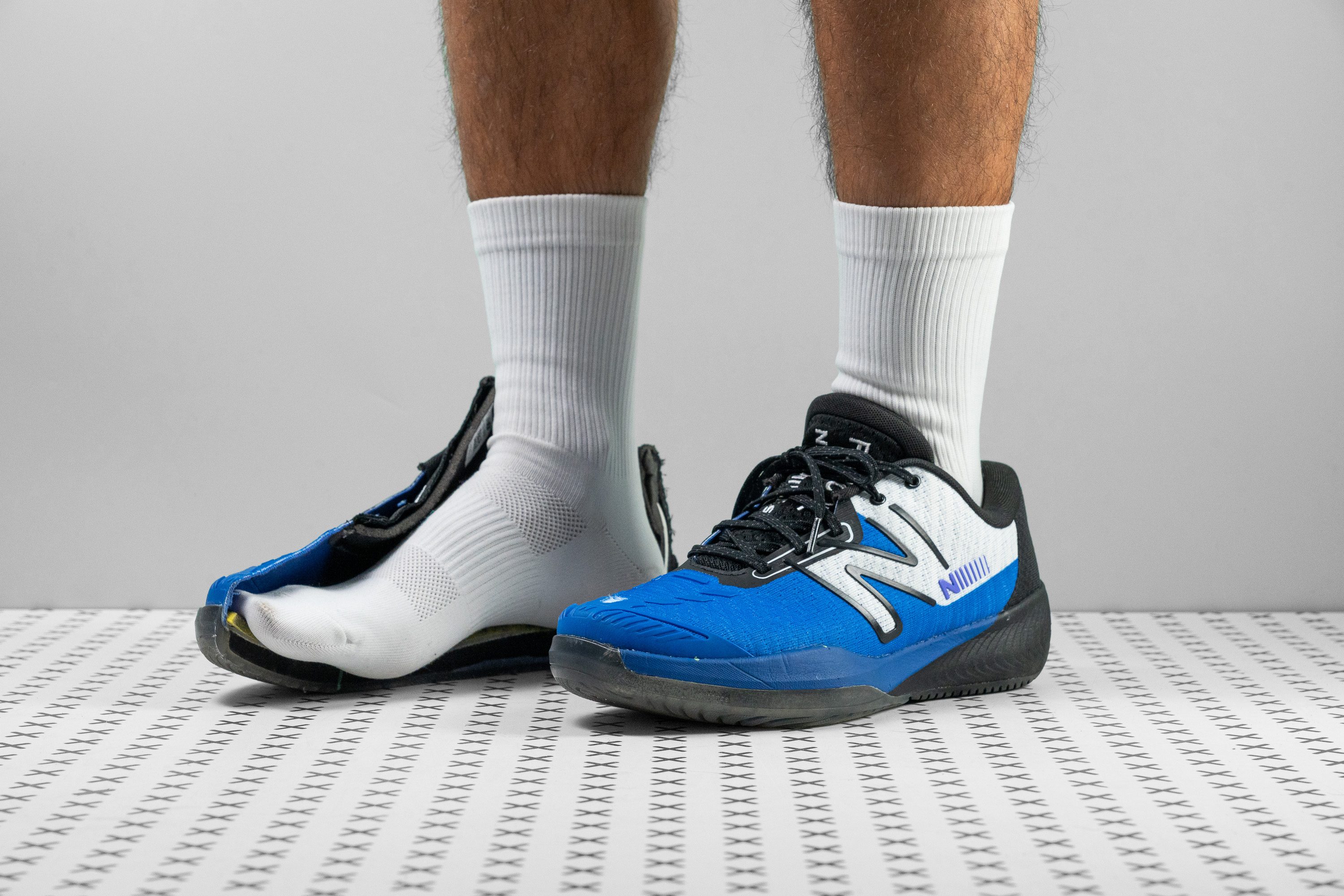Our verdict
- Top pick in best lightweight tennis shoes (2024)
Pros
- Speedy around the court
- Lightweight build
- Very grounded feel
- Lasting outsole
- Stiff and propulsive platform
- Unmatched upper comfort
- Wide-foot friendly
Cons
- Could be more breathable
- Not much side support
Audience verdict
- Top 15% in New Balance tennis shoes
Comparison
The most similar tennis shoes compared
+ + Add a shoe | |||||
|---|---|---|---|---|---|
| Audience score | 82 Good! | 62 Bad! | 88 Great! | 78 Good! | |
| Price | £150 | £130 | £120 | £65 | |
| Shoe type | Hard Court | Hard Court | All CourtHard Court | All CourtHard Court | |
| Shock absorption | - | - | Low | Low | |
| Energy return | - | - | Moderate | Moderate | |
| Traction | - | - | Low | High | |
| Construction | Speed | Speed | Speed | Stability | |
| Breathability | Moderate | Breathable | Breathable | Breathable | |
| Weight lab | 11.9 oz / 336g | 13.8 oz / 390g | 12.1 oz / 343g | 11.3 oz / 319g | |
| Lightweight | ✓ | ✗ | ✓ | ✓ | |
| Drop lab | 8.3 mm | 8.4 mm | 8.8 mm | 10.2 mm | |
| Width / fit | Medium | Wide | Medium | Medium | |
| Toebox width | Medium | Wide | Medium | Medium | |
| Size | Slightly small | Half size small | True to size | Slightly small | |
| Midsole softness | Firm | Balanced | Firm | Balanced | |
| Stiffness | Stiff | Stiff | Moderate | Flexible | |
| Torsional rigidity | Moderate | Stiff | Flexible | Moderate | |
| Heel counter stiffness | Flexible | Moderate | Moderate | Flexible | |
| Midsole width - forefoot | Average | Wide | Average | Narrow | |
| Midsole width - heel | Very narrow | Average | Narrow | Narrow | |
| Outsole durability | Good | Decent | - | Decent | |
| Heel padding durability | Decent | Bad | - | Bad | |
| Heel stack lab | 28.1 mm | 29.8 mm | 26.4 mm | 28.6 mm | |
| Forefoot | 19.8 mm | 21.4 mm | 17.6 mm | 18.4 mm | |
| Insole thickness | Average | Average | Average | Average | |
| Removable insole | ✓ | ✓ | ✓ | ✓ | |
| Heel tab | None | None | None | None | |
| Toebox durability | Decent | Decent | - | Bad | |
| Outsole hardness | Very hard | Hard | Average | Average | |
| Outsole thickness | Average | Average | Average | Average | |
| Ranking | #35 Bottom 33% | #42 Bottom 1% | #9 Top 22% | #35 Bottom 16% | |
| Popularity | #47 Bottom 11% | #39 Bottom 7% | #26 Bottom 38% | #16 Top 39% |
Who should buy
We believe that the New Balance 996 v5 is an excellent match for the players who:
- want a speed-oriented shoe that feels light and nimble on the feet
- prefer a more grounded underfoot experience and better court feel
- have wide feet as the shoe is available in multiple widths
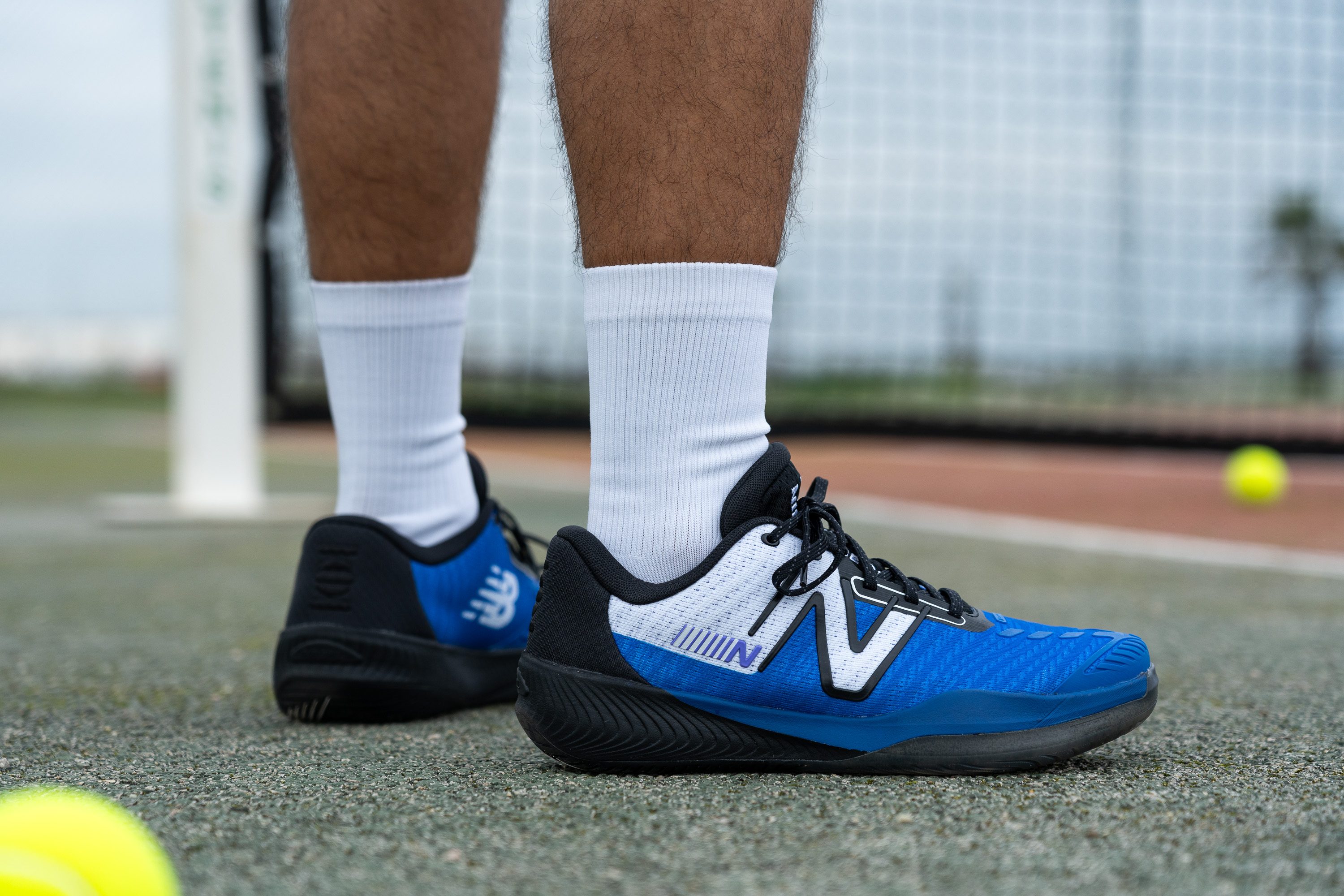
Who should NOT buy
To be honest, it is hard not to enjoy the New Balance FuelCell 996 v5. However, it may leave some people wishing for more if they expect plenty of support and stability. We recommend the ASICS Gel Resolution 9 and the Court FF 3 to these folks.
You might as well prefer the abovementioned shoes if you are an aggressive slider and need better upper reinforcement as well as a slide-friendly outsole.
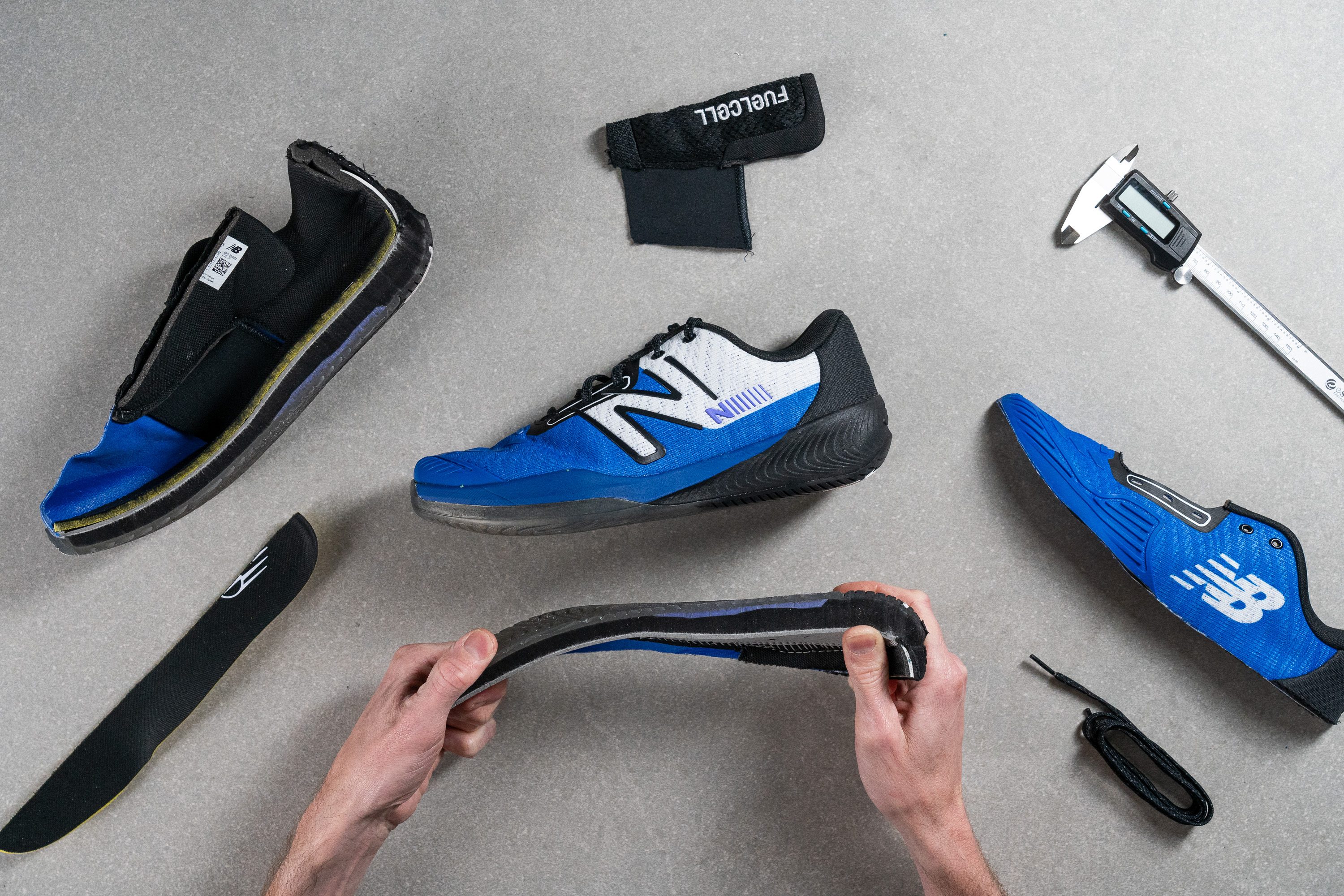
Cushioning
Heel stack
Players who want to stay fast and shifty on the court feel most at home in a grounded shoe. On foot, the New Balance 966 v5 feels quite bottom-light but we tooled up with a calliper to measure its precise stack height.
With a heel stack of 28.1 mm, this NB shoe is on the lower end of the spectrum.
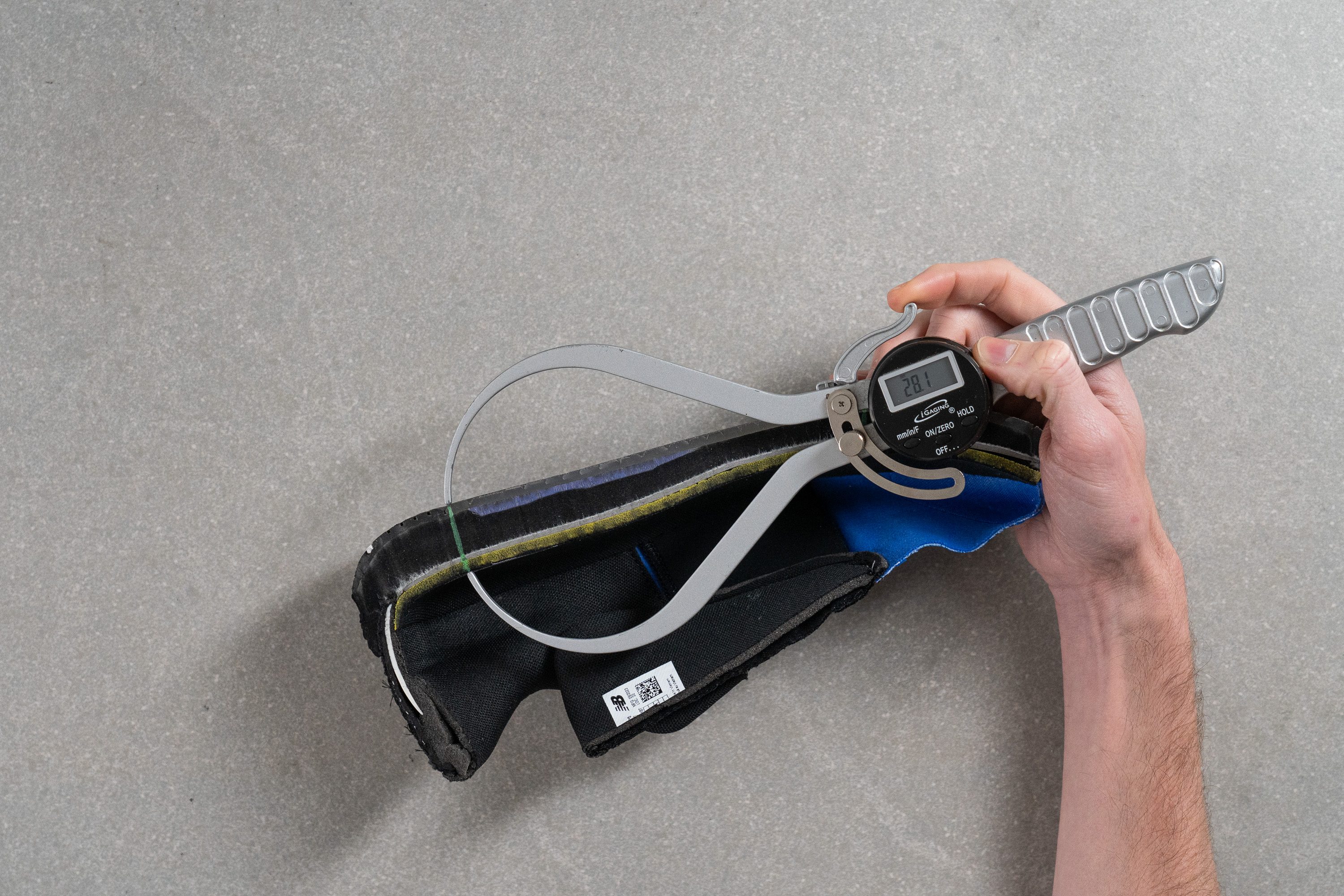
| FuelCell 996 v5 | 28.1 mm |
| Average | 29.2 mm |
Forefoot stack
Under the ball of the foot, our calliper showed 19.8 mm which is an average amount of forefoot cushioning for a tennis shoe.
It felt supportive on split steps and made us feel in control of quick direction changes.
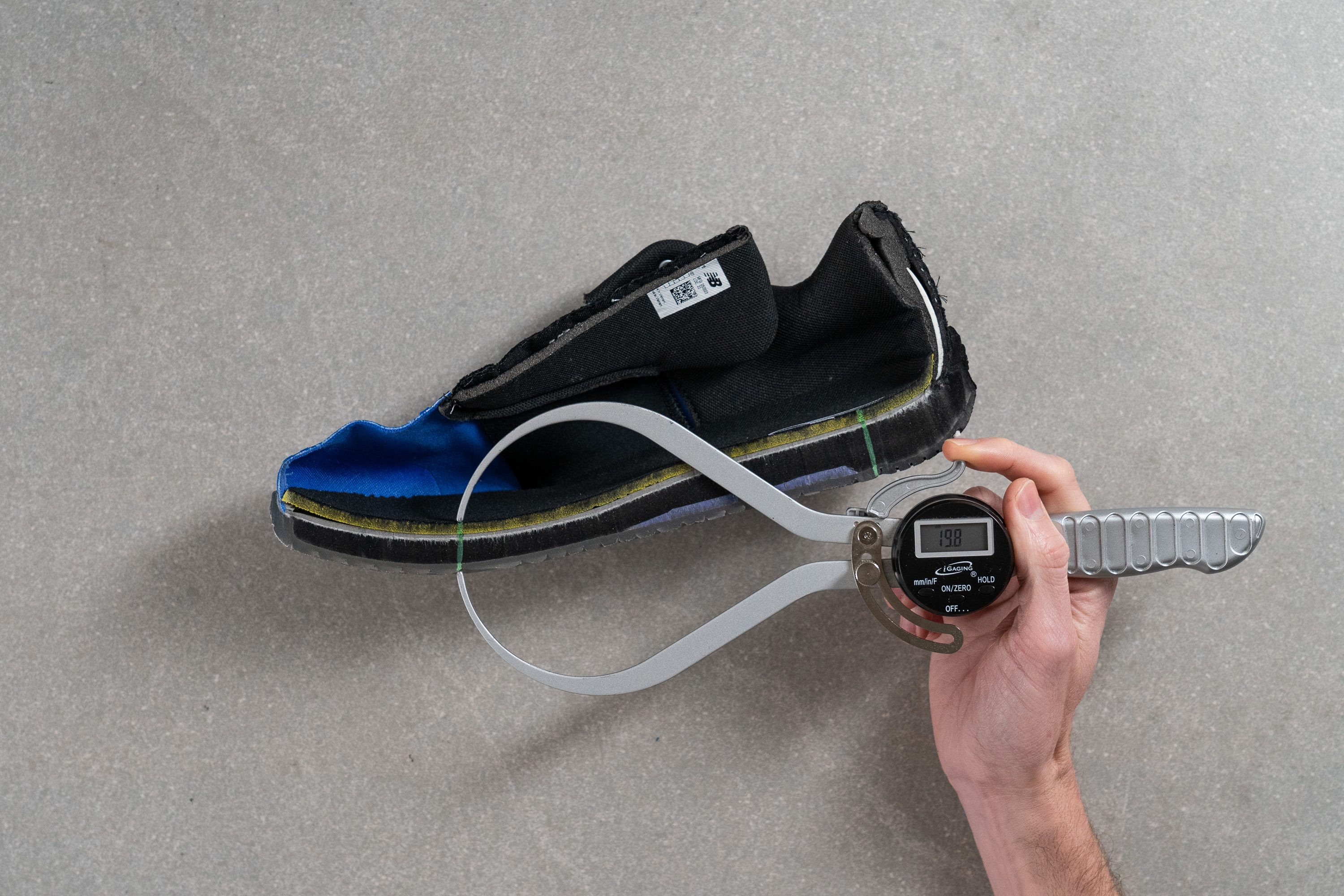
| FuelCell 996 v5 | 19.8 mm |
| Average | 19.3 mm |
Drop
What makes the New Balance 996 v5 feel so wonderfully intimate with the court is a fairly low difference in the heel and forefoot stack heights.
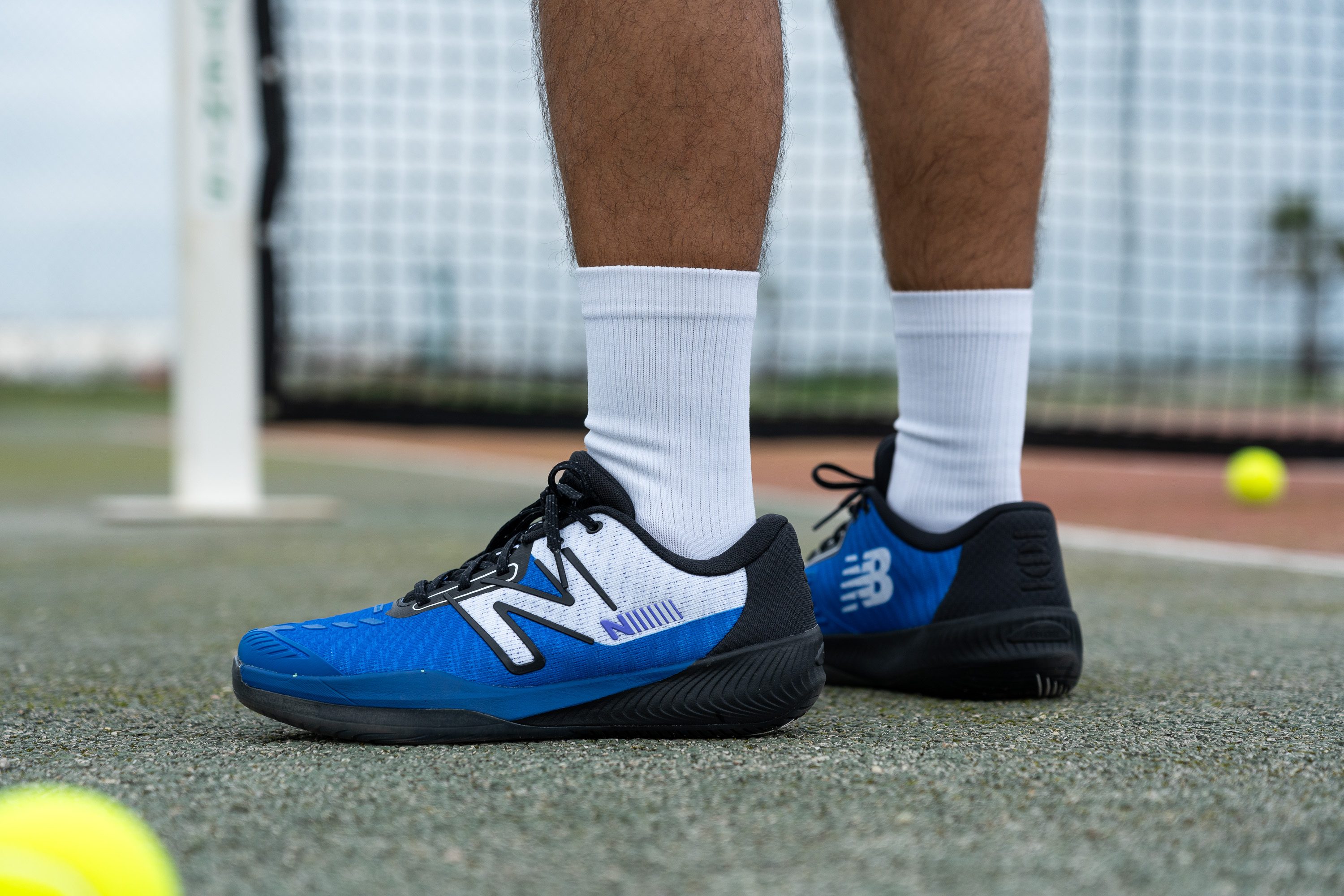
While 60% of tennis shoes have a drop of 9 mm or more, the 996 v5 comes in at 8.3 mm. If you are coming from a shoe like the Adidas Ubersonic (drop: 12.2 mm), you will definitely notice the difference. It feels as if your foot sits flat on the midsole as opposed to having a more cushioned and elevated heel.
We found this setup more optimal for agility and moving a lot from the net back to the baseline.
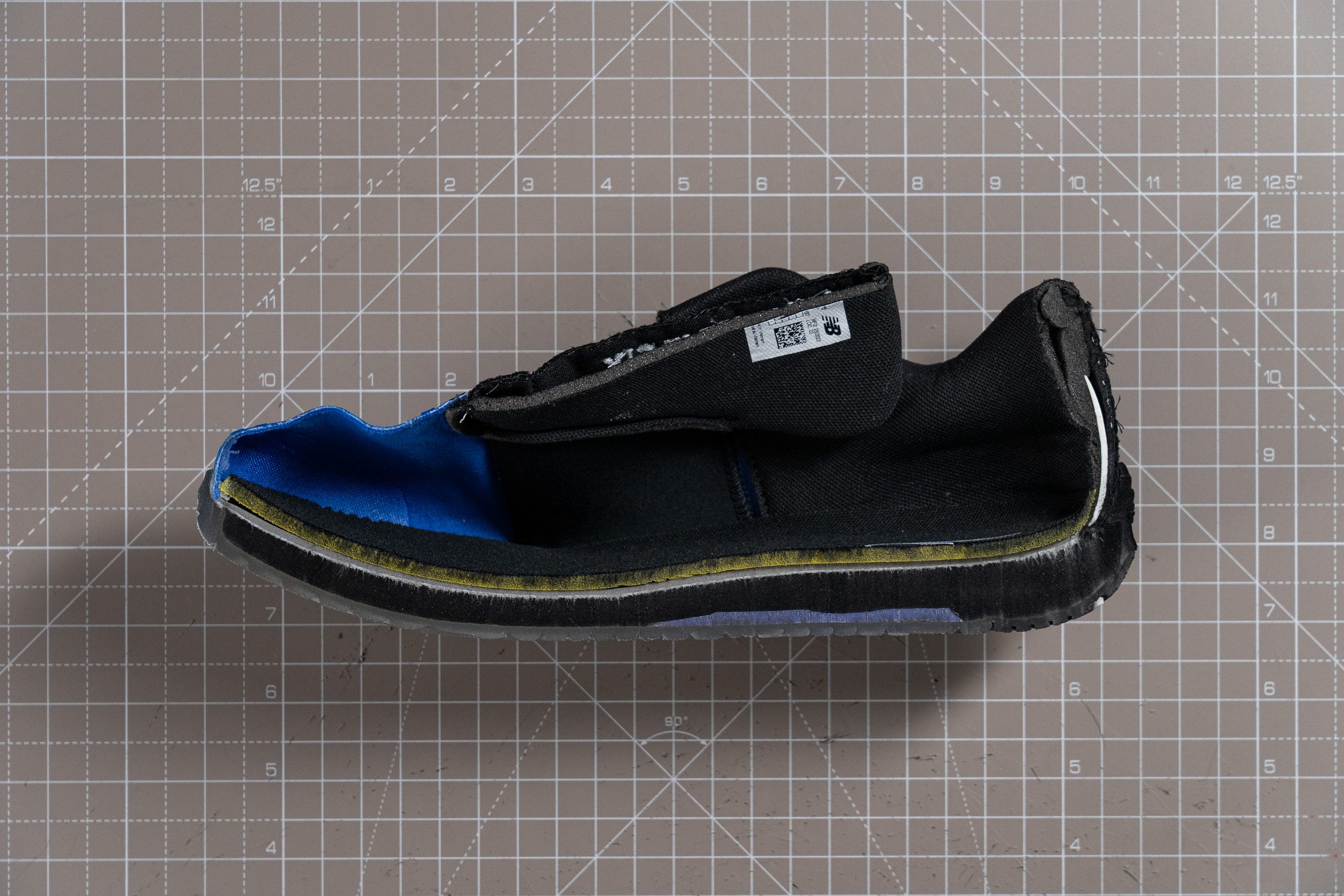
| FuelCell 996 v5 | 8.3 mm |
| Average | 9.9 mm |
Midsole softness
This tennis shoe from New Balance employs a full-length FuelCell foam for cushioning. Familiar with this material from NB running shoes, we have grown fond of the cloud-like feeling it delivers.
And it delivers the same heavenly comfort in the 996 v5 tennis shoe! It is the kind of shoe that you don't want to take off immediately after the session is over. We believe that tennis coaches may benefit from the all-day goodness of this shoe.
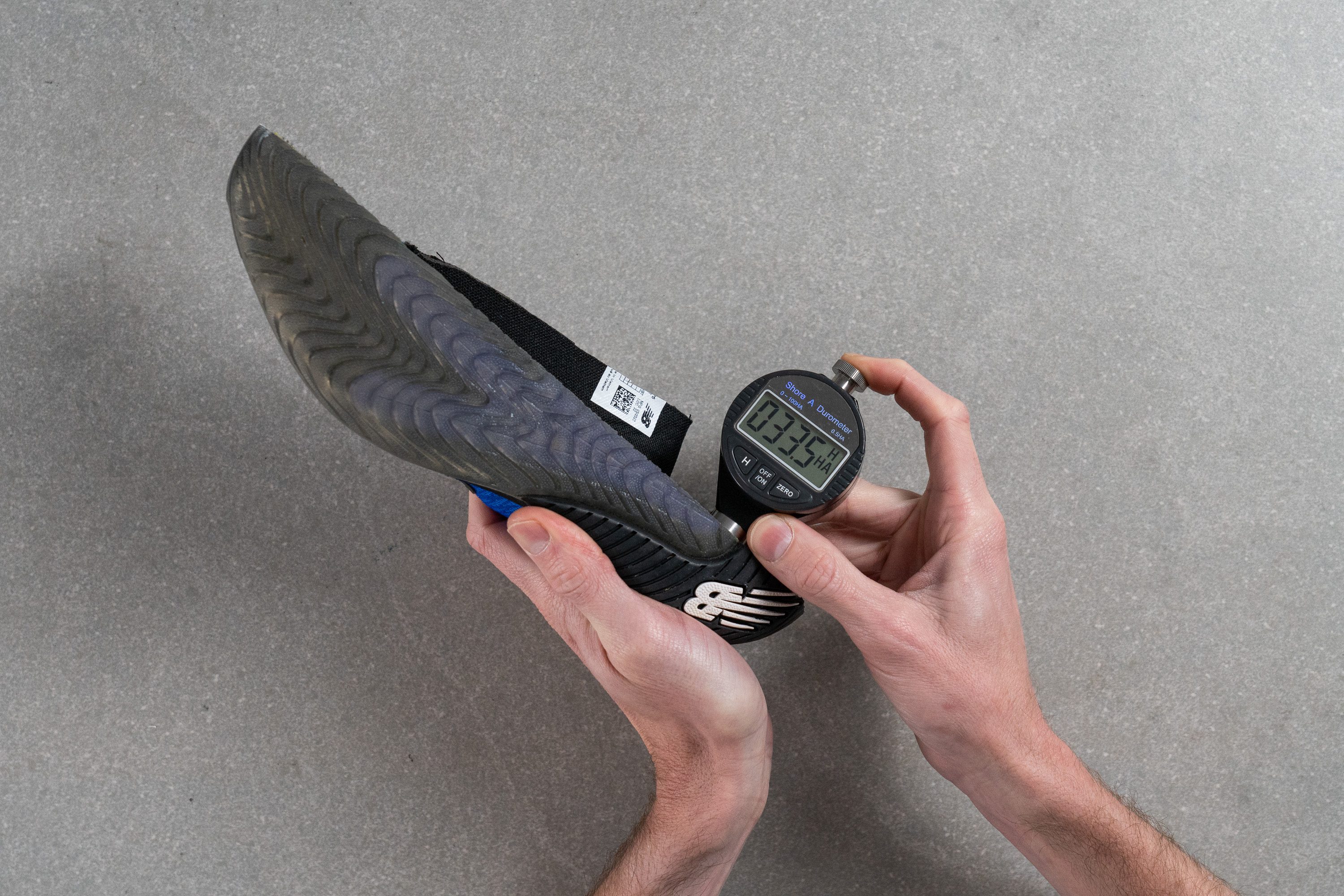
| FuelCell 996 v5 | 33.5 HA |
| Average | 28.1 HA |
Size and fit
Size
New Balance FuelCell 996 v5 fits slightly small (16 votes).
Internal length
| FuelCell 996 v5 | 267.4 mm |
| Average | 271.2 mm |
Width / Fit
No matter what your foot width is, New Balance is always a safe brand to rely on. Our medium feet were more than happy with the room offered in a standard D width. And the upper seems to have broken in a bit during the playtest as well.
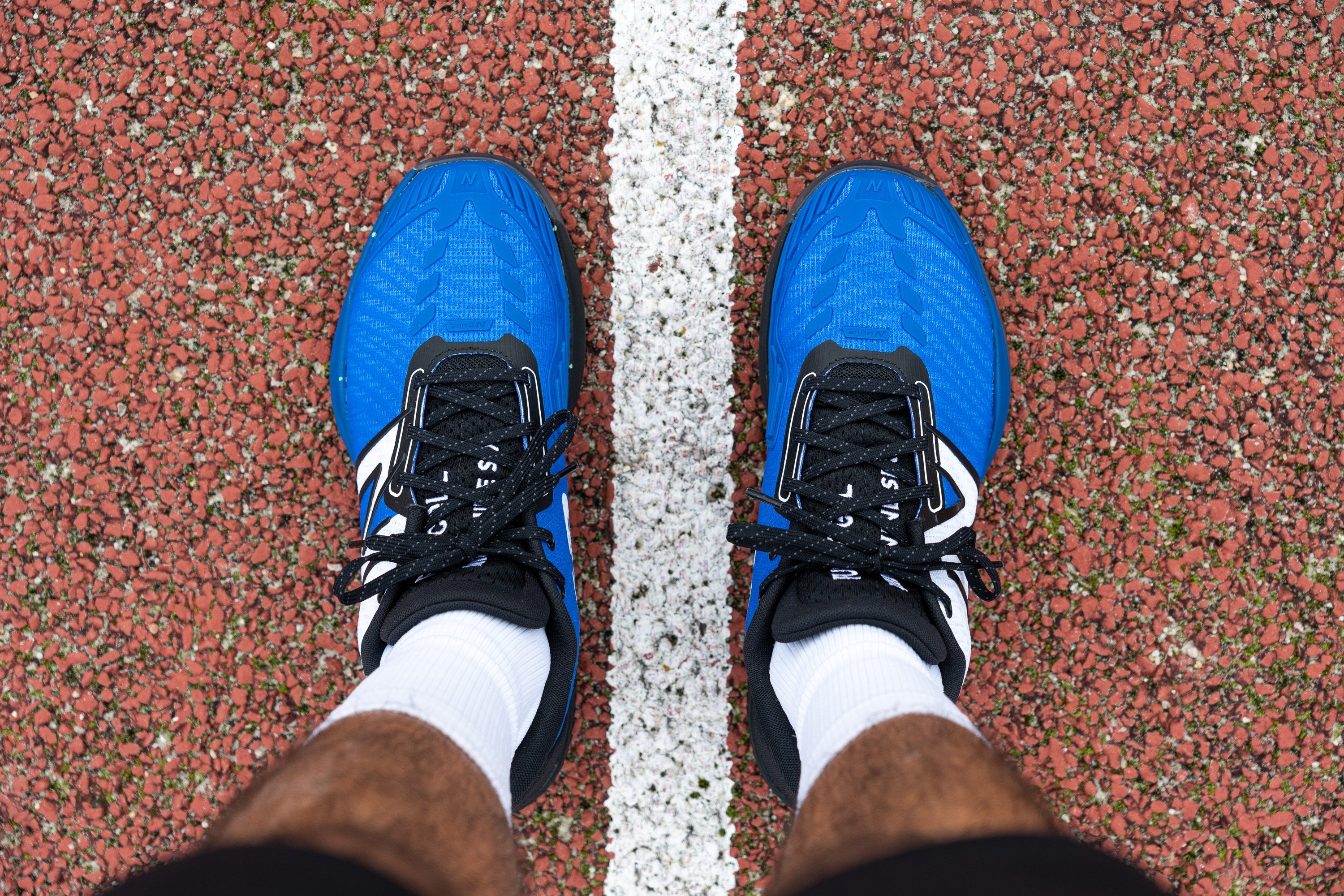
Measuring the widest part of the shoe's toebox, our caliper showed 98.8 mm which is a regular width for a tennis shoe in this size.
And if you need more, this version of the 996 is also available in 2E wide and 4E extra wide.
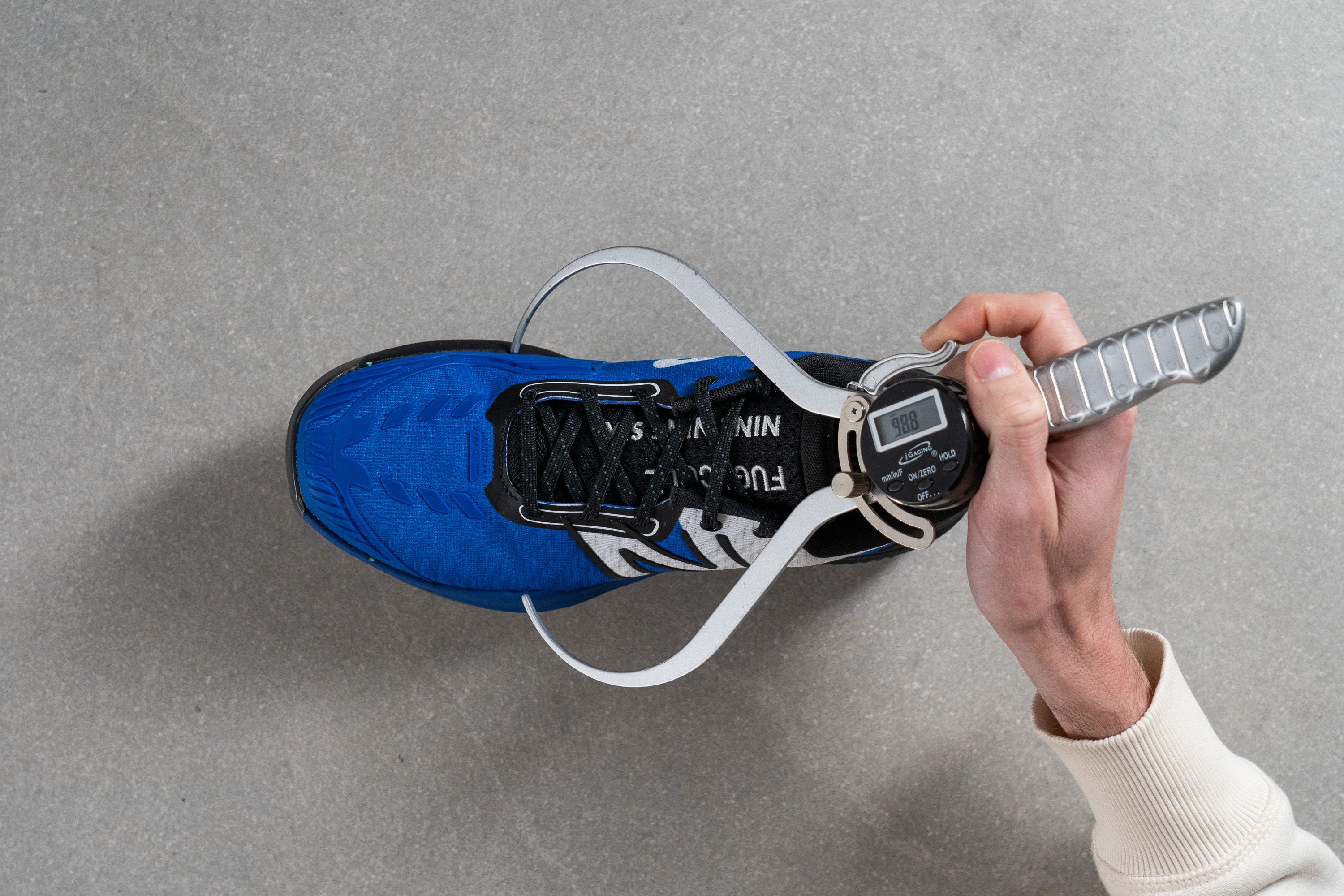
This test follows an older methodology, which is why you don't see recently tested shoes in the chart. Results from different methodologies can not be compared.
| FuelCell 996 v5 | 98.8 mm |
| Average | 101.0 mm |
Toebox width
There is no aggressive tapering at the tip of the toebox either. Putting the caliper at the big toe mark, it returned 77.3 mm. That means no pointy toes!
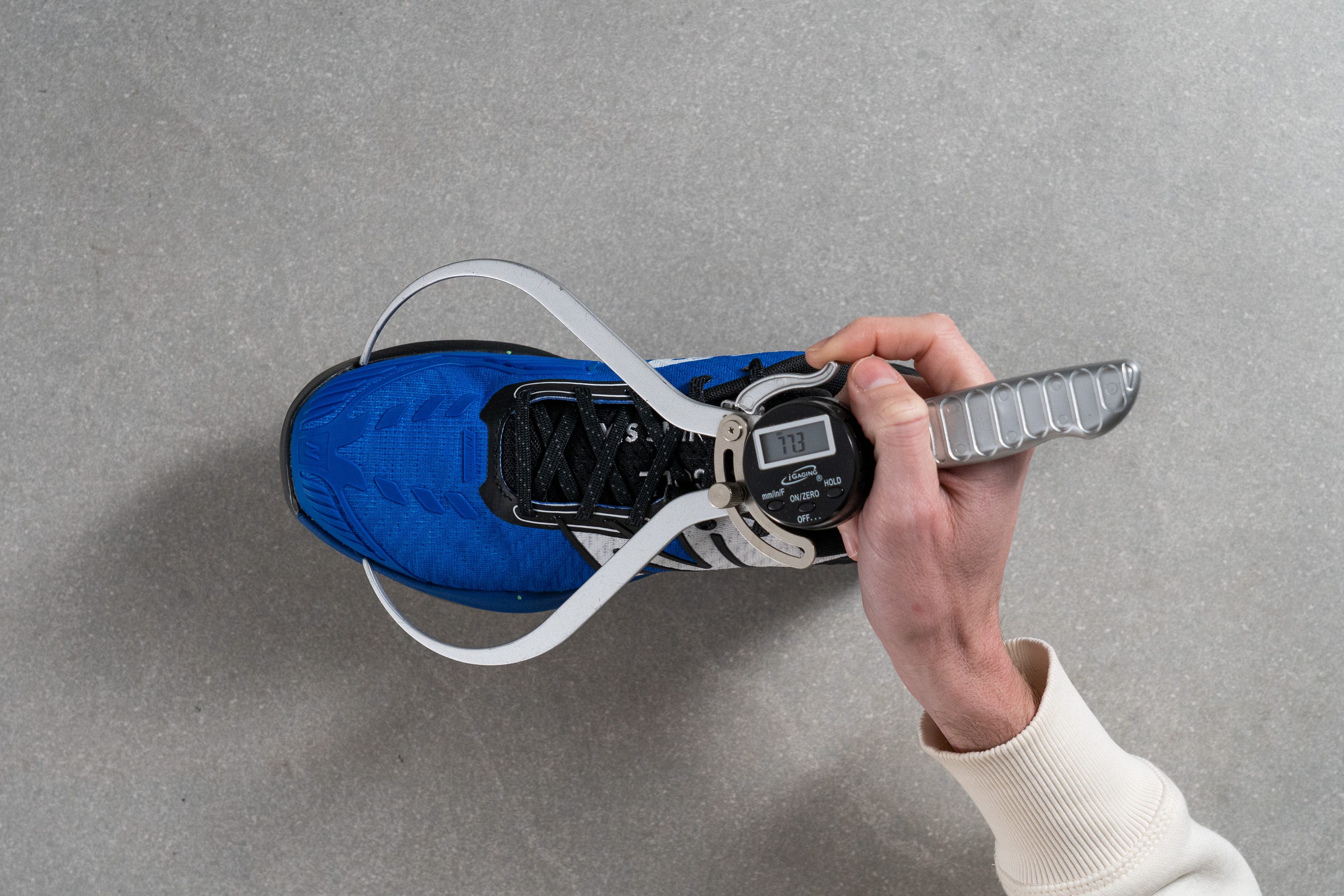
This test follows an older methodology, which is why you don't see recently tested shoes in the chart. Results from different methodologies can not be compared.
| FuelCell 996 v5 | 77.3 mm |
| Average | 76.9 mm |
Flexibility / Stiffness
The chicken-foot shank doesn't go unnoticed in the New Balance 996 v5. In addition to stabilizing the midsole, its stiffness helps to create propulsion that encourages quicker foot transitions.
A rolled shape of the shoe's heel also helps the foot to roll from heels to toes more easily.
But how stiff are we talking? Based on the measurement of our force gauge, it takes 44.9N to bend the 996 v5 to a 90-degree angle. That's a good 25% more than it takes an average tennis shoe!
This test follows an older methodology, which is why you don't see recently tested shoes in the chart. Results from different methodologies can not be compared.
| FuelCell 996 v5 | 44.9N |
| Average | 30.7N |
Weight
As a speed-oriented shoe, we expected the New Balance 996 v5 to feel light on the foot and that's exactly what we got! It kept us nimble through the tennis session.
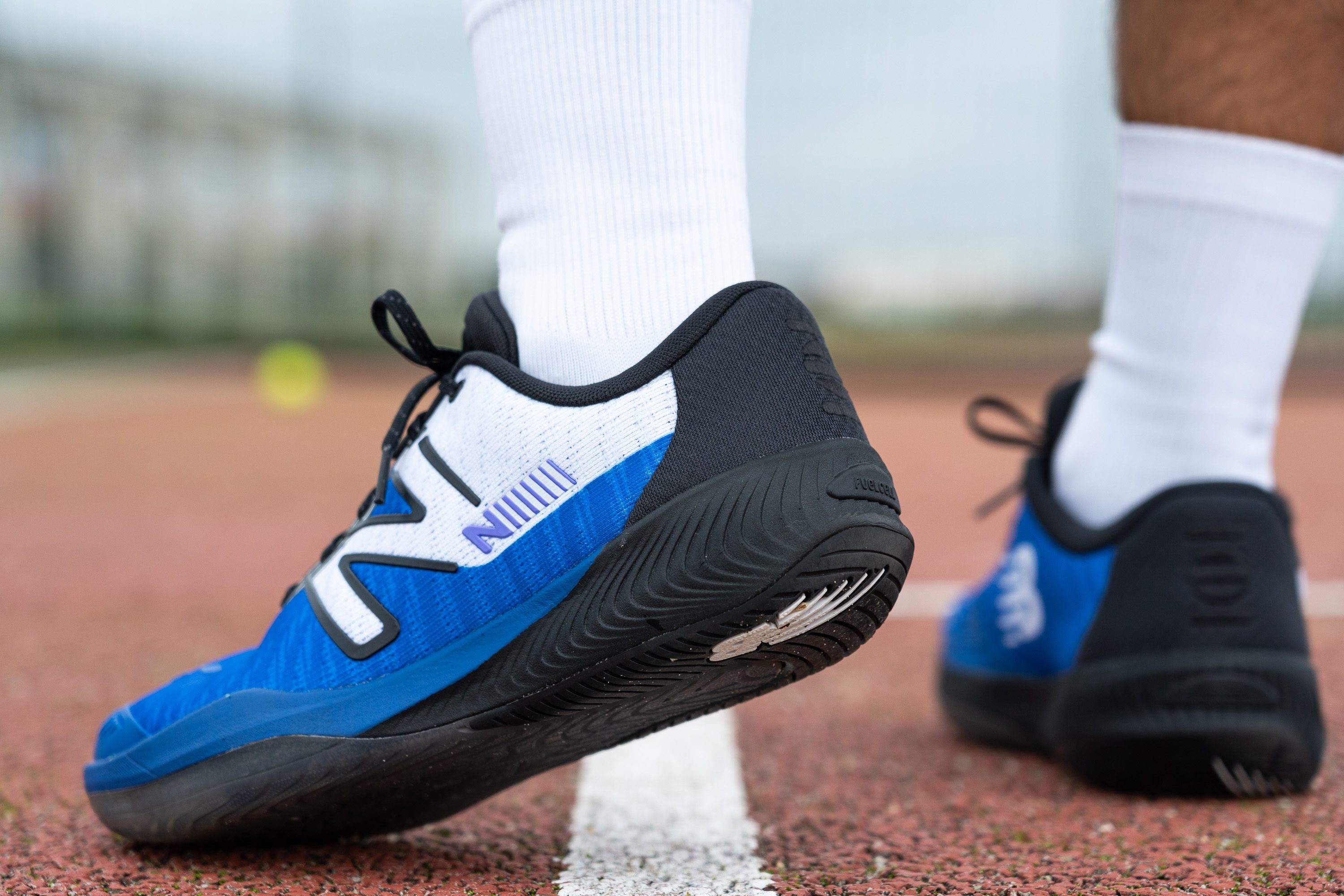
On our scale, we weighed the shoe at 11.9 oz (336g) in a men's US size 9. That's an ounce lighter than the average tennis shoe.
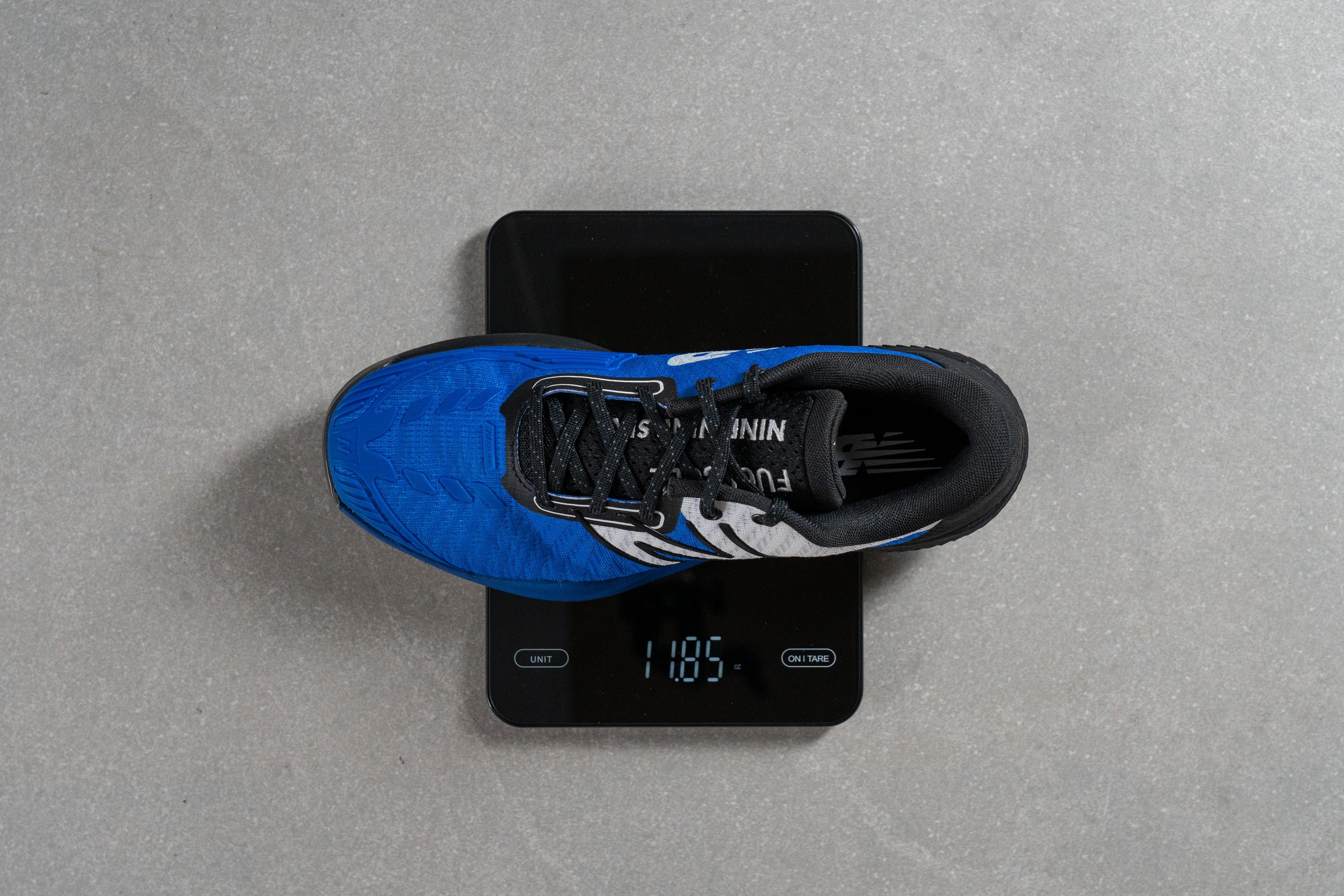
| FuelCell 996 v5 | 11.9 oz (336g) |
| Average | 12.8 oz (364g) |
Breathability
As the heat started to build up on our playtest, we found our feet wishing for a bit more ventilation. We wouldn't call this New Balance stuffy but it is certainly not highly ventilated either.
In the lab, we used a smoke-pumping machine to test the shoe's ventilation capacity. For this, we filled the shoe's upper with smoke and found that none of it passed through the toebox! Even in the most breathable part of the upper (the tongue), the smoke got out at an inconsistent pace.
Curious to see where the shoe's ventilation pores are concentrated, we hovered its half-cut upper over the light.
And we couldn't even see them! Small ones can be seen in the tongue but they are not as pronounced as in other tennis shoes. Thus, we had to take some breathability points away, rating the shoe with only 3 out of 5.
To give you an even closer look, we grabbed our microscope.
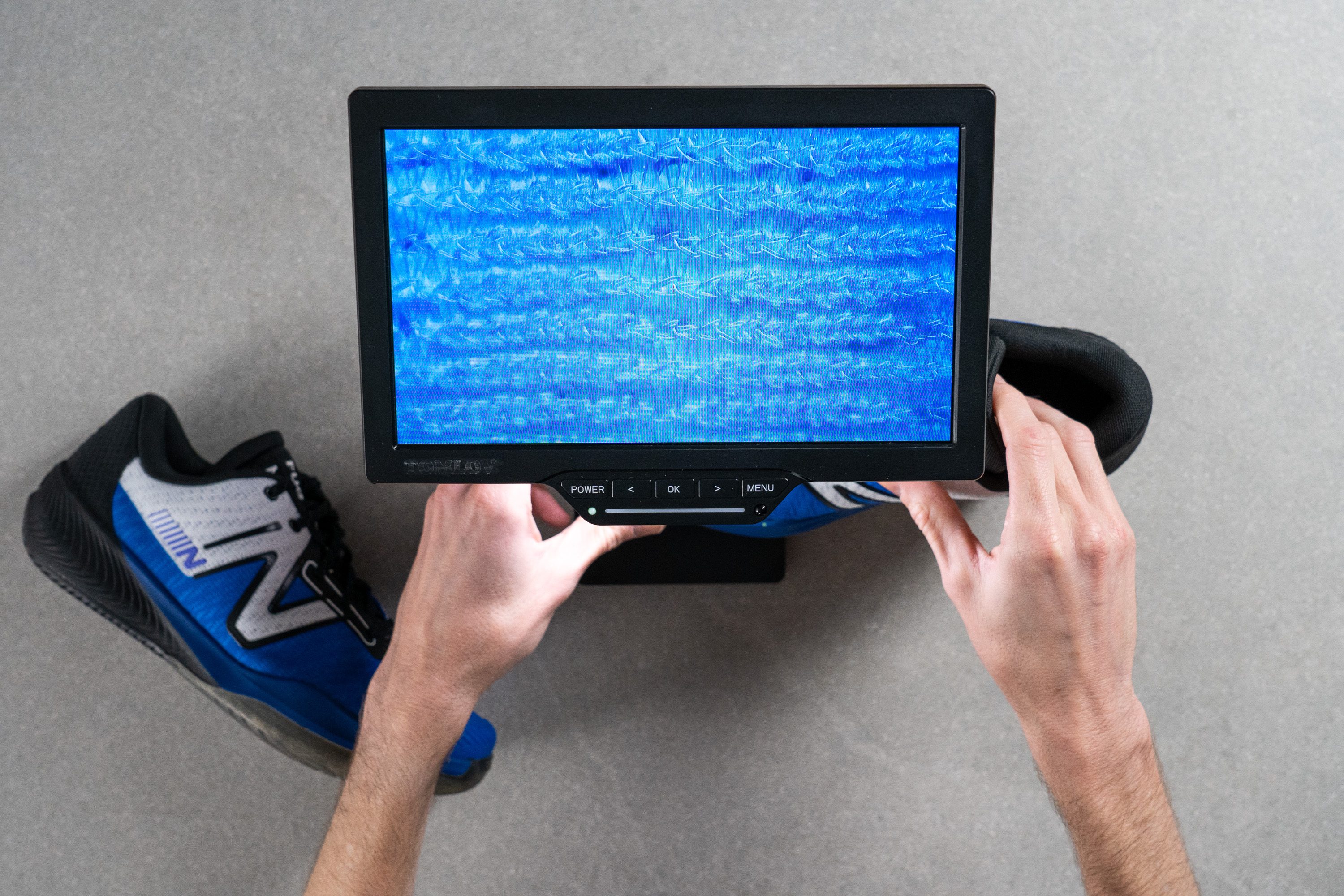
Given how densely woven this mesh material is, the openings are too minuscule to let that much air pass through.
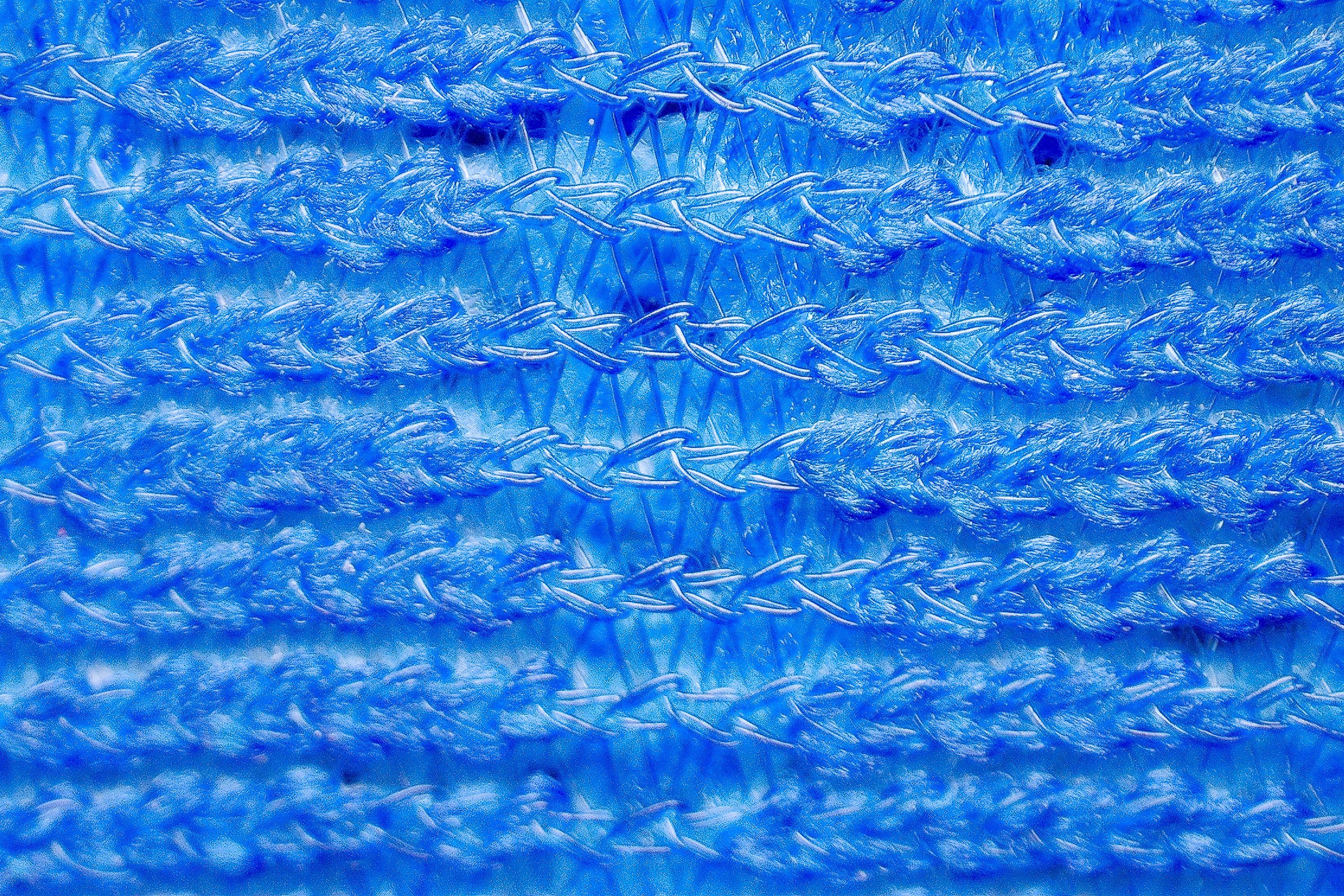
| FuelCell 996 v5 | 3 |
| Average | 3.1 |
Stability
Lateral stability test
The New Balance 996 v5 is not the shoe to rely on if you seek excellent arch support. You can see from our side-to-side shifting test that there is a lot of ankle play going on.
Don't get us wrong, this NB shoe has a very stable platform but there is just not a lot of support around the ankle and on the sides of the shoe.
That's why we cannot recommend this model to folks with excessive pronation and other foot conditions that require extra support.
Torsional rigidity
While it looks ridiculous, the chicken-foot shank inside the shoe's midsole actually creates a stable base. Its three "branches" point in different directions, creating a pretty stable push-off area.
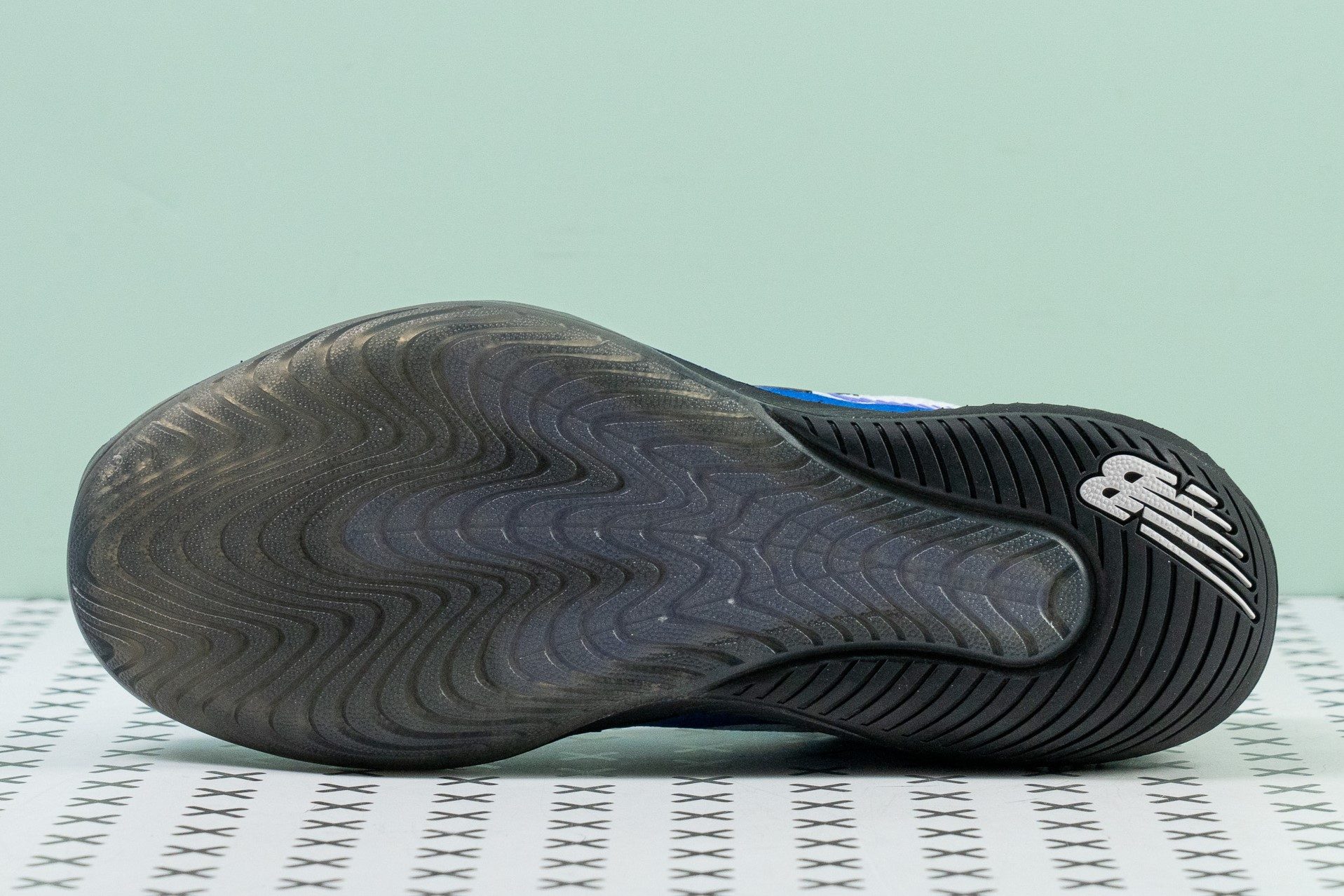
It also gives the shoe its torsional rigidity which we rated quite high on our stiffness index. Where 5 is maximum stiffness, we gave it a score of 4.
| FuelCell 996 v5 | 4 |
| Average | 4.5 |
Heel counter stiffness
The heel counter is one of the areas where the NB 996 v5 cuts corners on support. It is soft and comfy but there is not much structural integrity here.
Pushing and squeezing it in our manual test, we rated its stiffness with a moderate score of 3 out of 5. Given that tennis shoes average at 4, this New Balance shoe is on the more forgiving side.
This is not bad news, especially for players who prefer the manoeuvrability to a super tight heel hold. It is more of a warning to those who rely heavily on support in this area.
| FuelCell 996 v5 | 3 |
| Average | 4.1 |
Midsole width - forefoot
The platform of this tennis shoe is not the widest for sure. But in the forefoot, it features a much-needed outrigger to stabilise the foot as it jumps forcefully to the side. Fast-paced cutting felt very supported in the 996 v5.
Measuring the distance between the widest points of the forefoot, our calliper showed 113.5 mm. That is within the typical width range of court shoes.
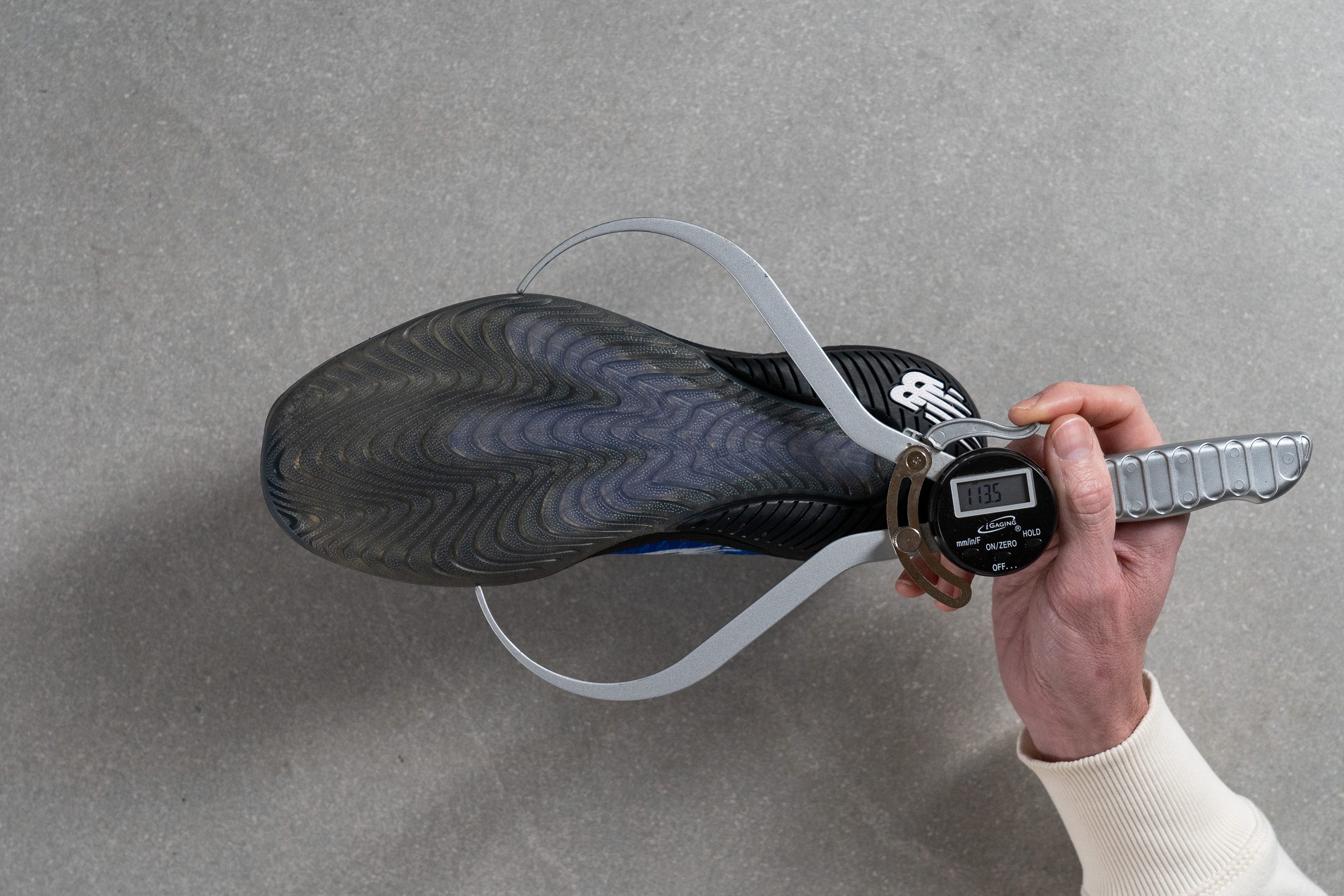
| FuelCell 996 v5 | 113.5 mm |
| Average | 112.0 mm |
Midsole width - heel
However, in the heel, the landing area is not so wide. Based on our measurement, it is only 83.6 mm. That's narrower than the similarly built shoes like the Adidas Adizero Ubersonic 4.1 (88.4 mm) and the SoleMatch Control (90.3 mm).
The New Balance 996 v5 is a shoe for players who stay on their toes a lot.
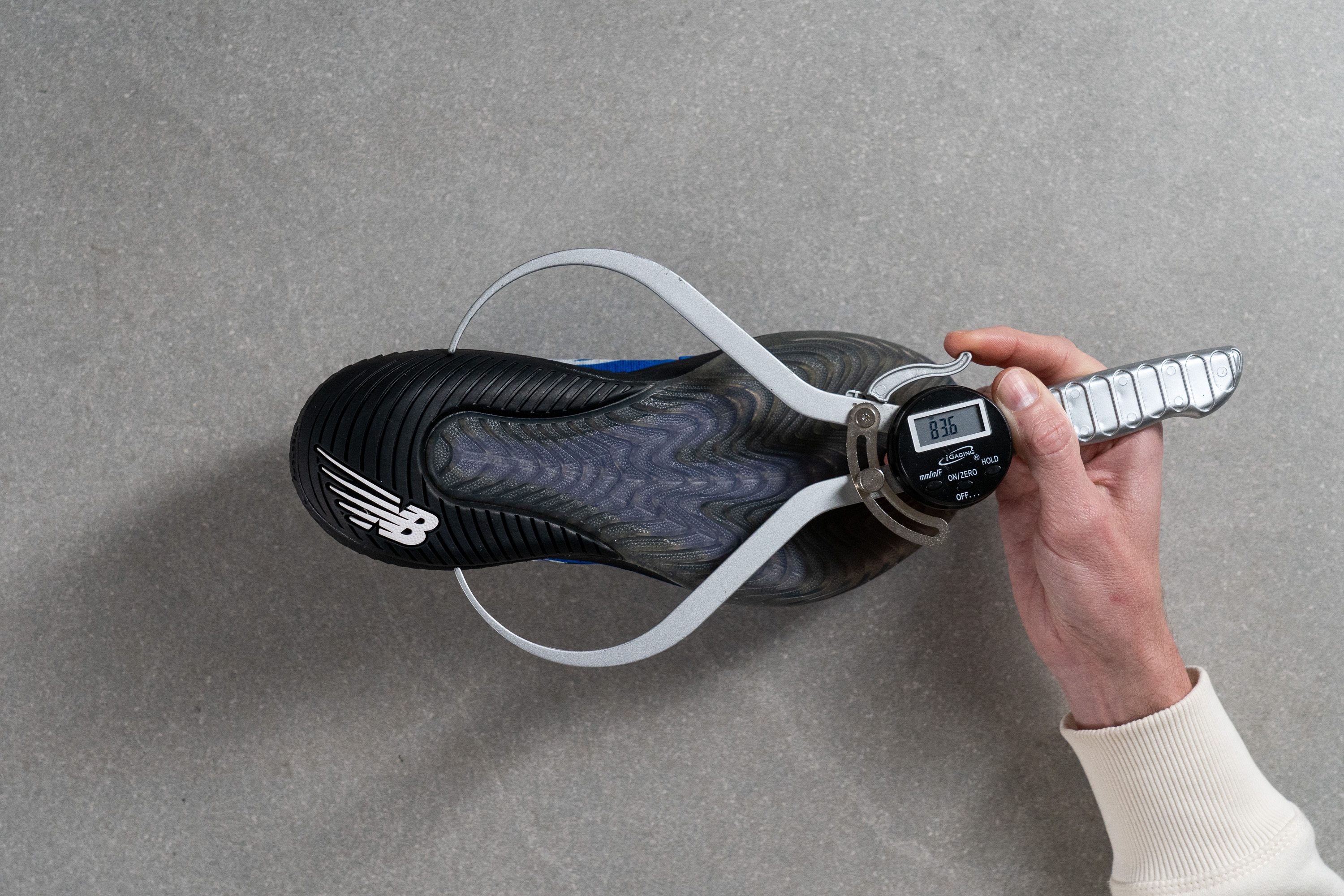
| FuelCell 996 v5 | 83.6 mm |
| Average | 89.8 mm |
Durability
Toebox durability
The toebox of the 996 v5 is quite well reinforced with sturdy overlays around the tip as well as on the medial side. We believe that it's got a sufficient toe drag guard for its weight class.
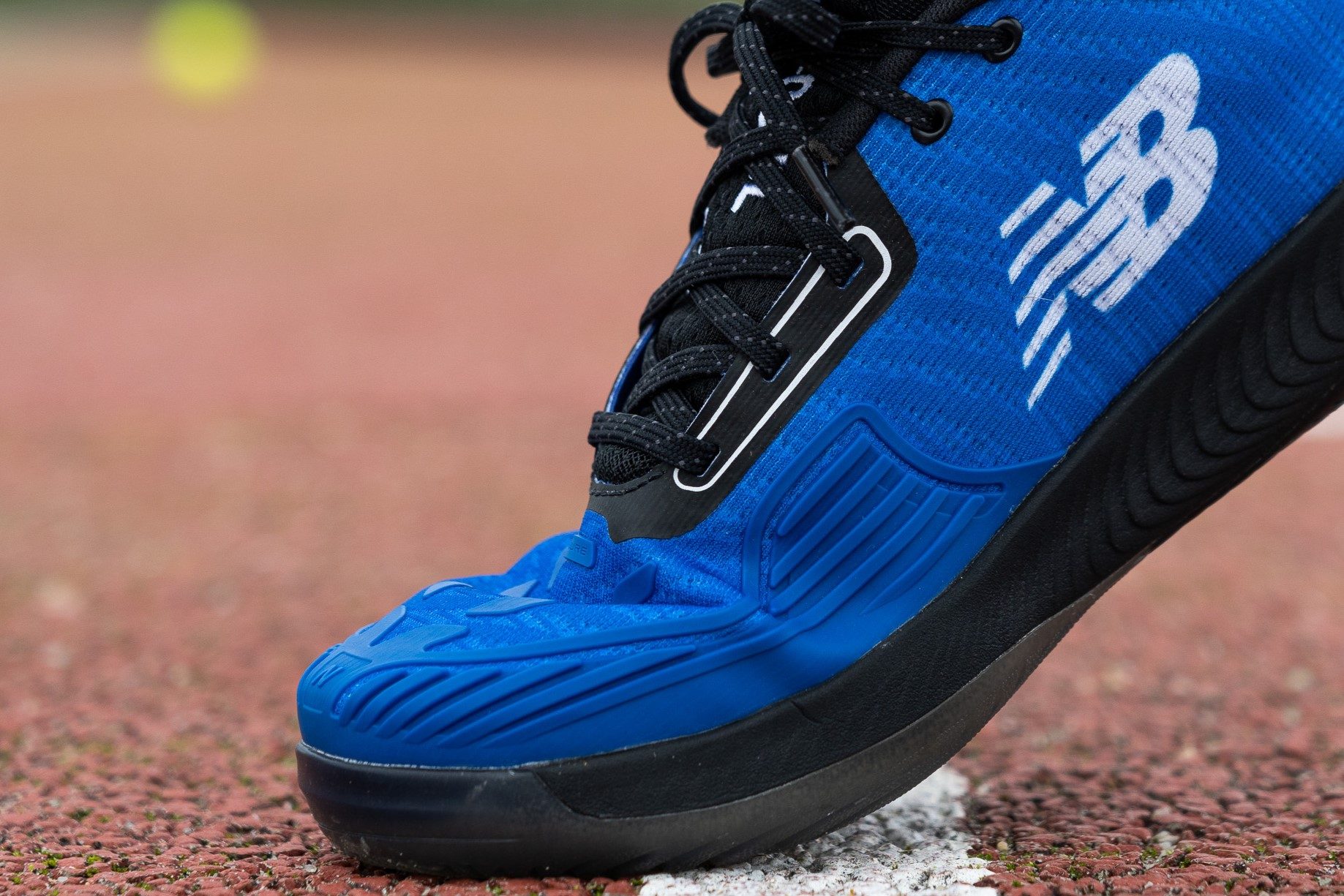
Just be careful not to slash the areas with exposed mesh fabric. As our Dremel test shows, it is not the most durable material.
Drilling it at the speed of 5K RPM for 12 seconds, the abrasion was notable but not detrimental. But because there was no see-through hole either, we can confidently rate this shoe's toebox durability as 3 out of 5.
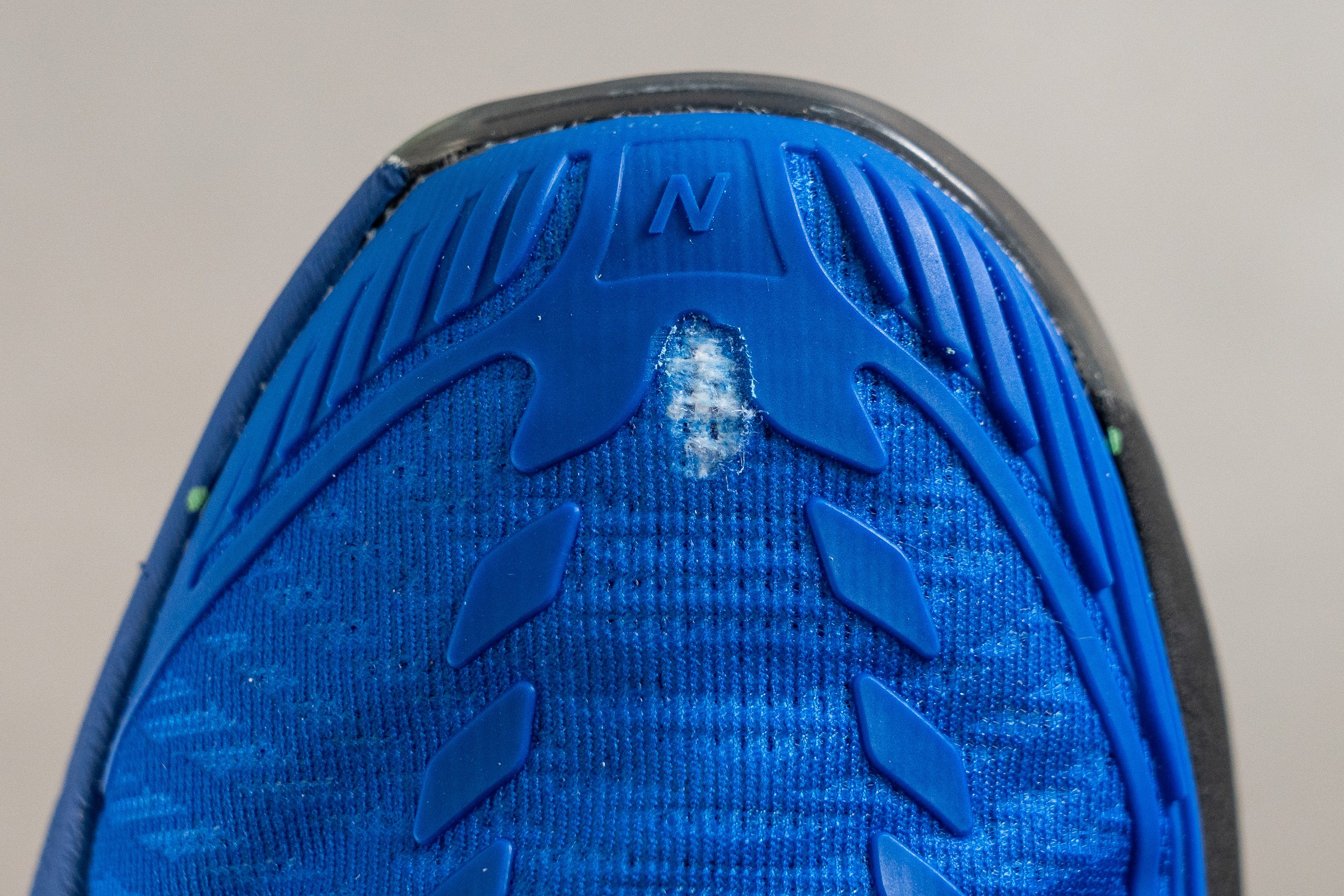
But if this makes you concerned and you want the absolute best protection, we can highly recommend the ASICS Solution Speed FF 2.
| FuelCell 996 v5 | 3 |
| Average | 3.7 |
Heel padding durability
As for the abrasion resistance of the inner lining, it showed quite promising results!
Applying the Dremel to the inner side of the heel counter, we drilled the material for 5 seconds at the speed of 5K RPM.
Even though the damage was visible, the collar padding remained relatively intact. This gives us high hopes as forceful movements on the court cause a lot of friction on the interior lining of the heel cup.
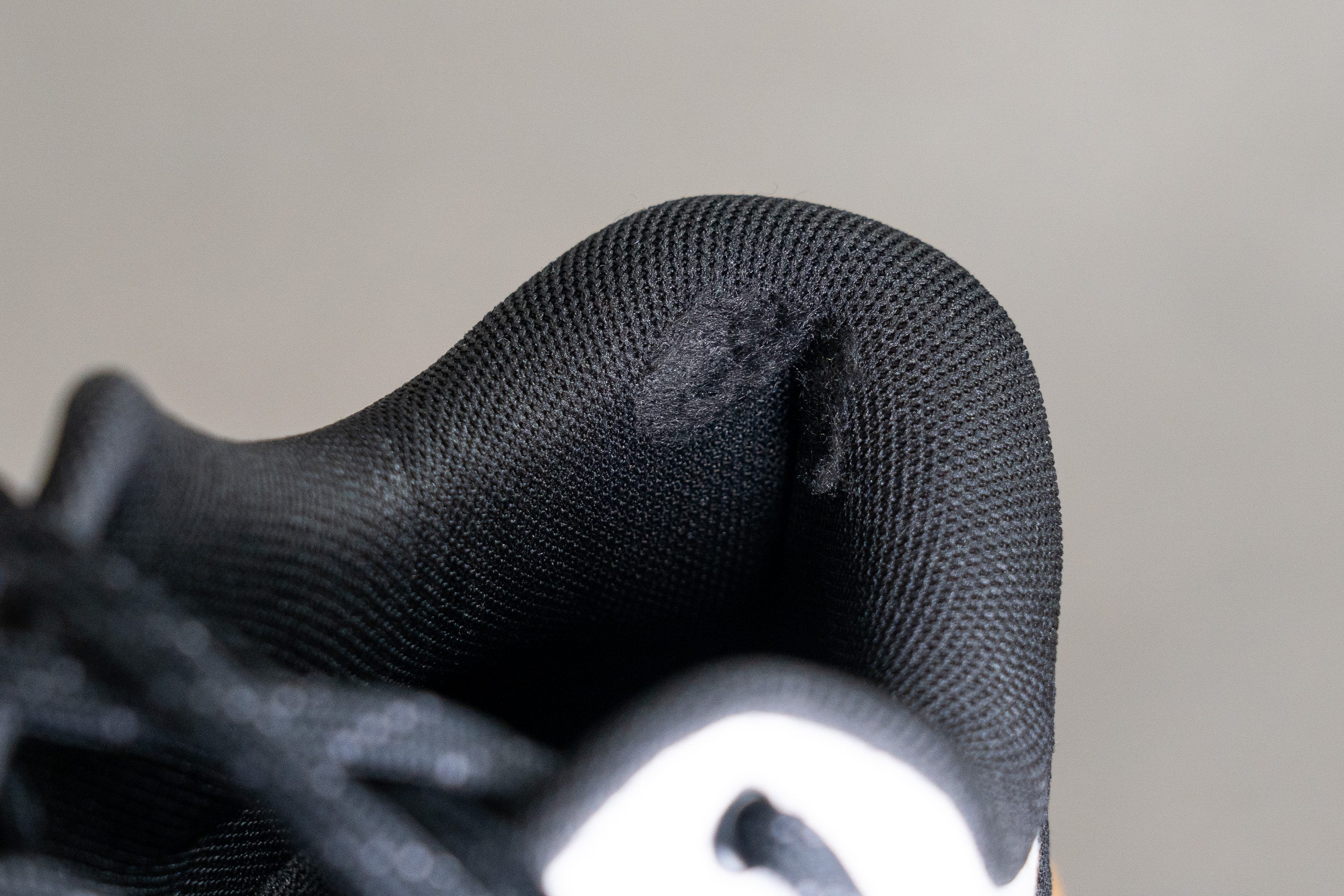
| FuelCell 996 v5 | 3 |
| Average | 3.3 |
Outsole hardness
Given the toll that hard court takes on tennis shoes, the outsole of the New Balance 996 v5 proved its ability to sustain the damage.
First of all, it is a very firm rubber compound. Using a durometer, we measured it at 92.0 HC which is among the hardest we've seen in the lab. And in most cases, hard means more durable.
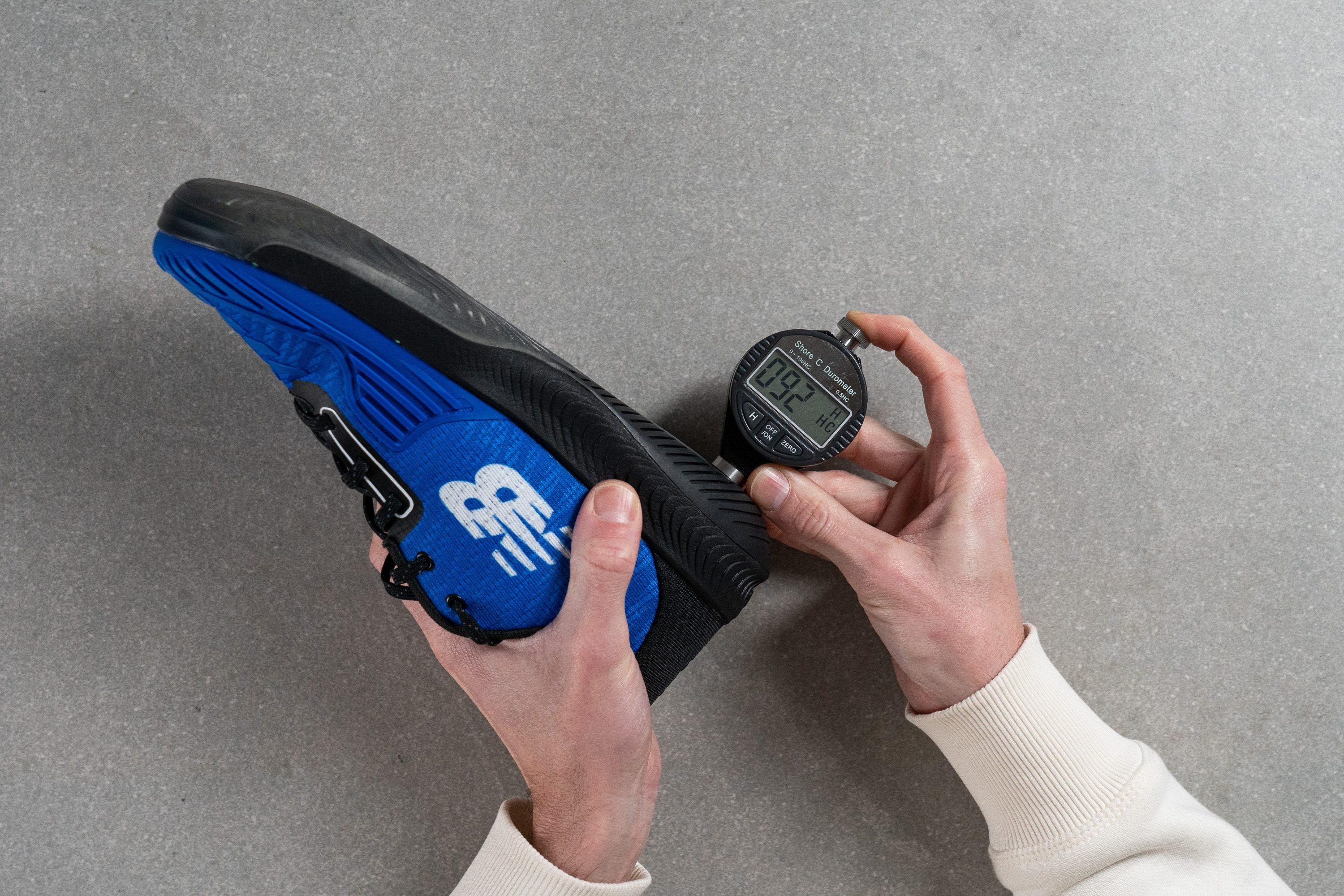
| FuelCell 996 v5 | 92.0 HC |
| Average | 86.0 HC |
Outsole durability
Luckily, this is the case for the 996 v5 as well. As our most demanding durability test showed, the outsole of this New Balance shoe can resist the high-speed drilling of the Dremel with flying colours!
For consistency in test results, we drill every tennis shoe in the same spot while applying the same pressure (3.2N) and speed (10K RPM). We also hold the tool's sandpaper tip against the rubber for 22 seconds.
Once done, we could barely even see the damage on the shoe's outsole. According to our tread gauge, it is a shallow as 0.6 mm which is a fantastic result for a hard-court shoe!
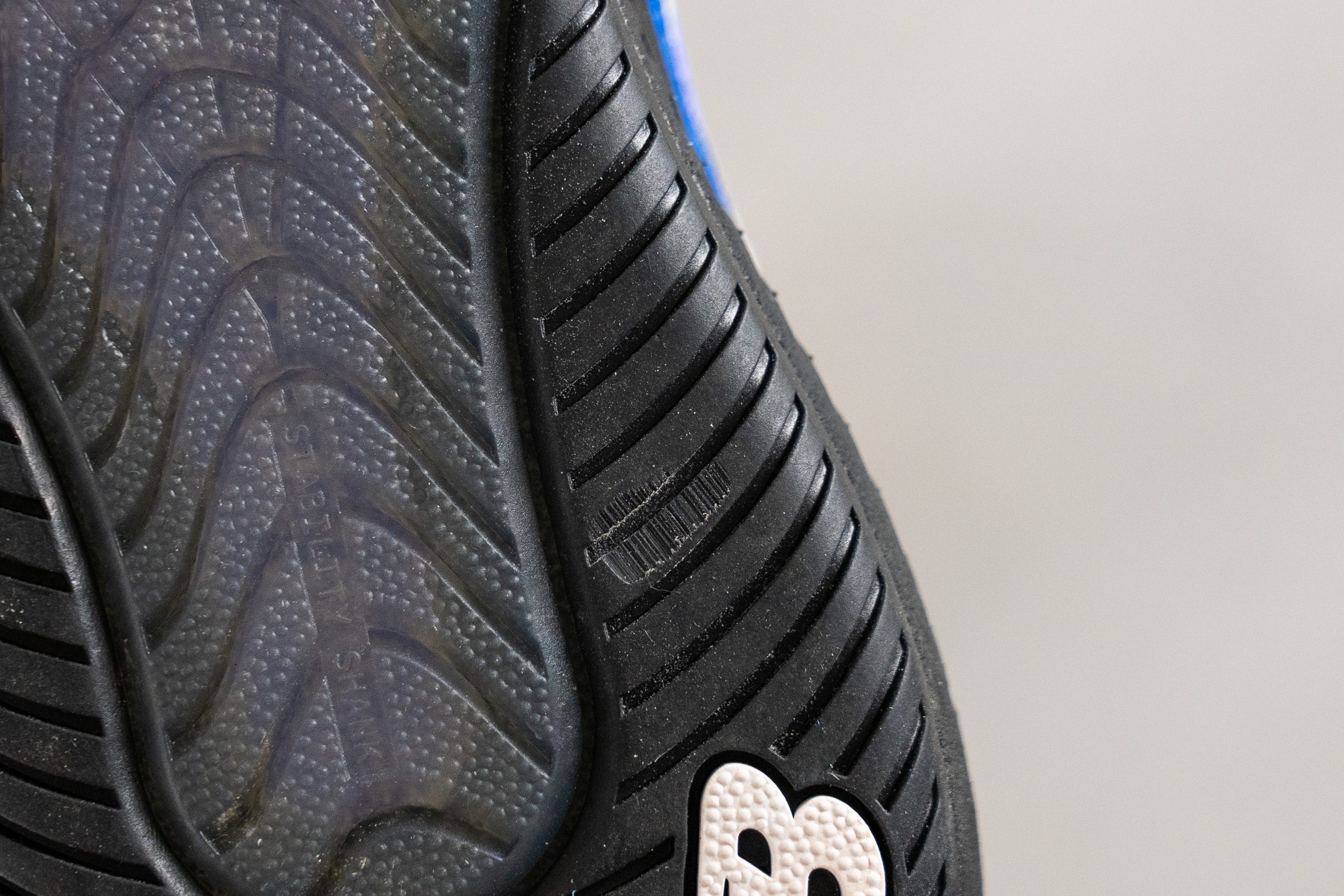
| FuelCell 996 v5 | 0.6 mm |
| Average | 0.7 mm |
Outsole thickness
But no matter how durable the rubber is, it also must be thick enough to sustain long-term wear and tear. Measuring the shoe's outsole thickness, our calliper showed 4.2 mm. This is exactly what we would expect from a tennis shoe.
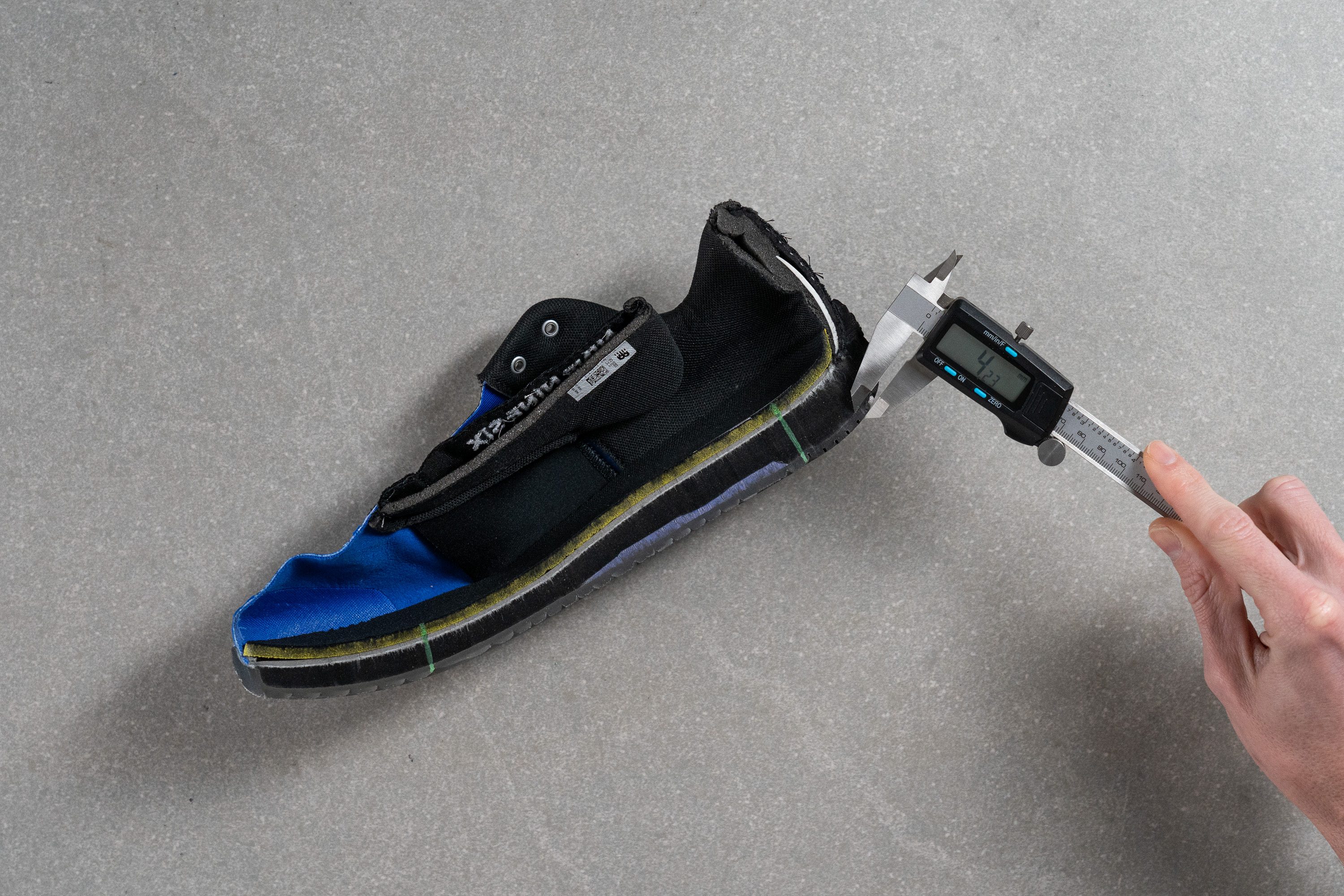
| FuelCell 996 v5 | 4.2 mm |
| Average | 4.2 mm |
Misc
Insole thickness
The underfoot comfort of this New Balance shoe is amplified by a very well-padded insole. Our calliper shows 4.4 mm of thickness in the heel area which is a good amount for a tennis shoe.
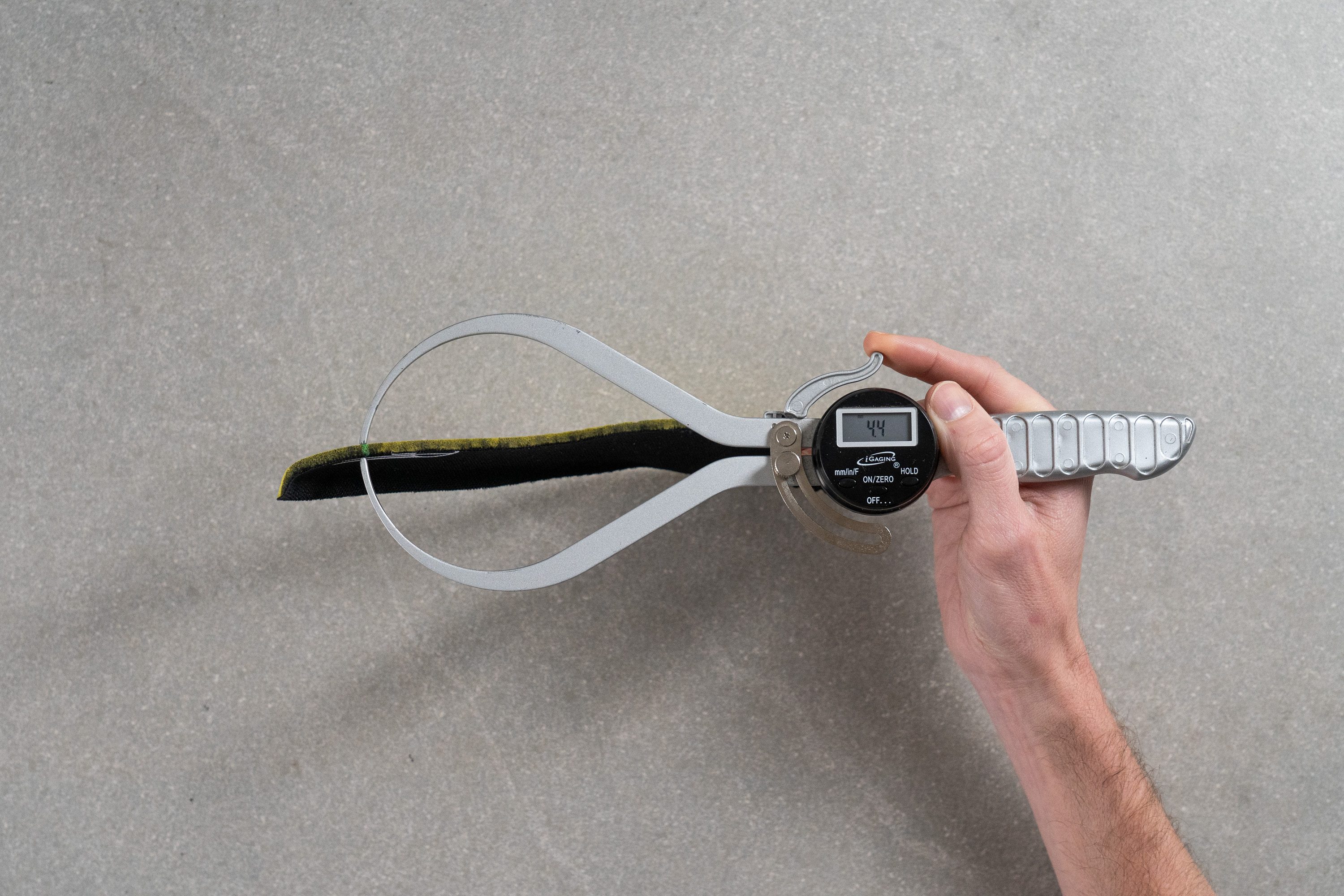
| FuelCell 996 v5 | 4.4 mm |
| Average | 5.1 mm |
Removable insole
The shoe's insole is easy to remove in case you want to level up the comfort with a custom insert.
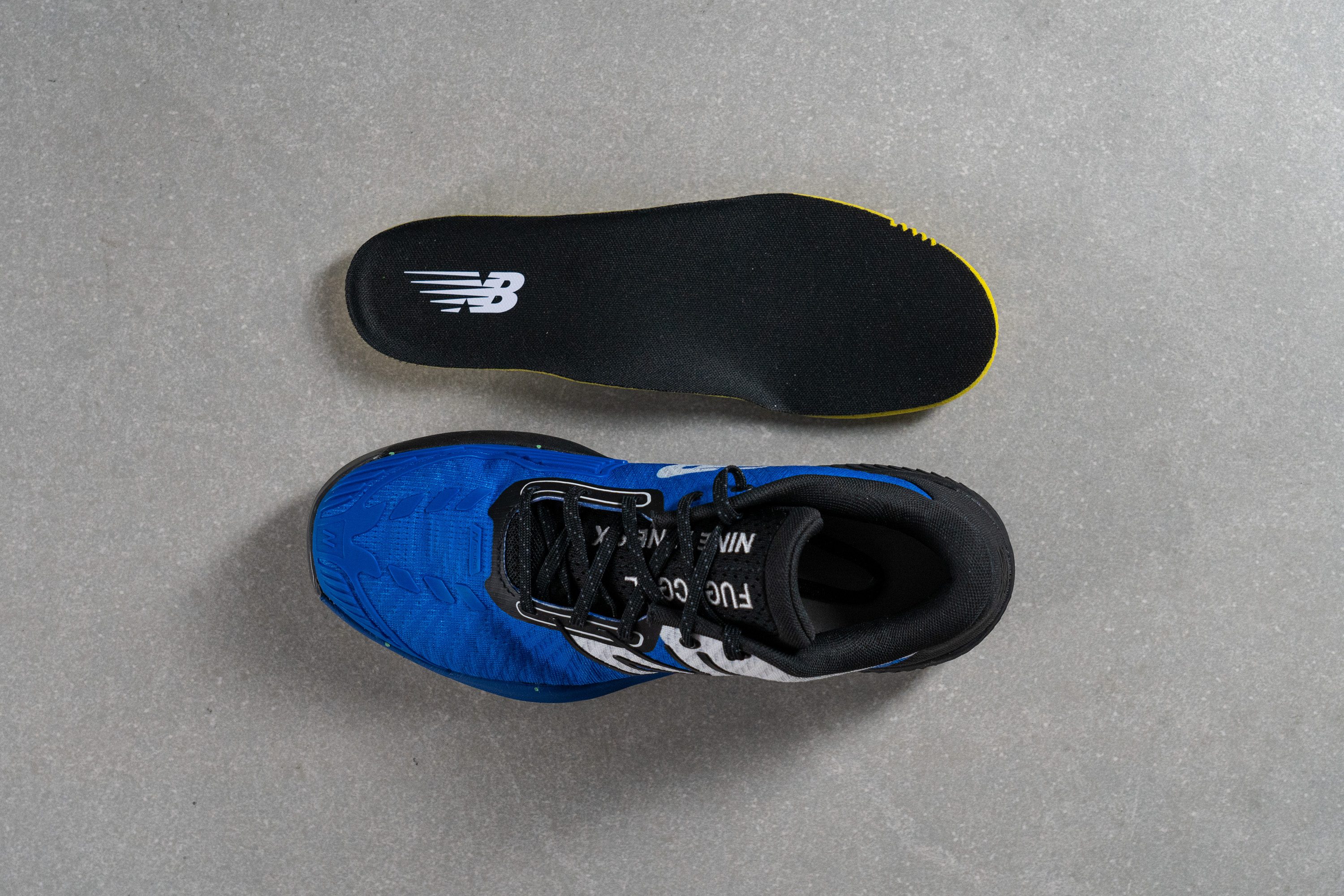
| FuelCell 996 v5 | Yes |
Tongue padding
The shoe's interiors may not be as padded as in some other tennis shoes but boy are they plush!
The 996 v5 feels amazingly soft against the foot. And even though our calliper showed only 5.9 mm, it was more than enough to prevent lace bites and pressure.
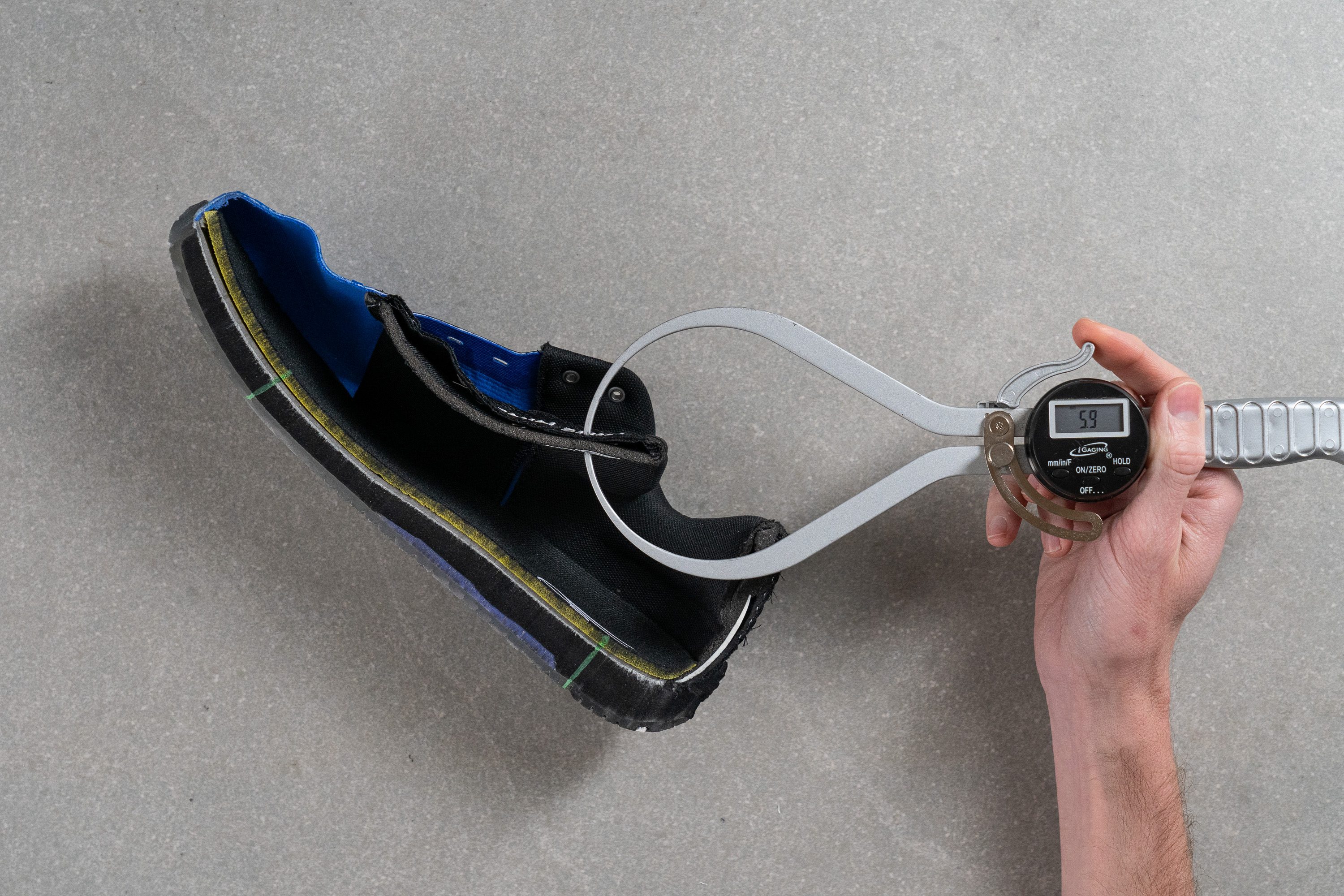
| FuelCell 996 v5 | 5.9 mm |
| Average | 8.2 mm |
Tongue: gusset type
Tongue gussets are always such a welcome feature in a tennis shoe! In the 996 v5, it is semi-gusseted and stretchy which translates to a secure foothold and zero sliding of the tongue!
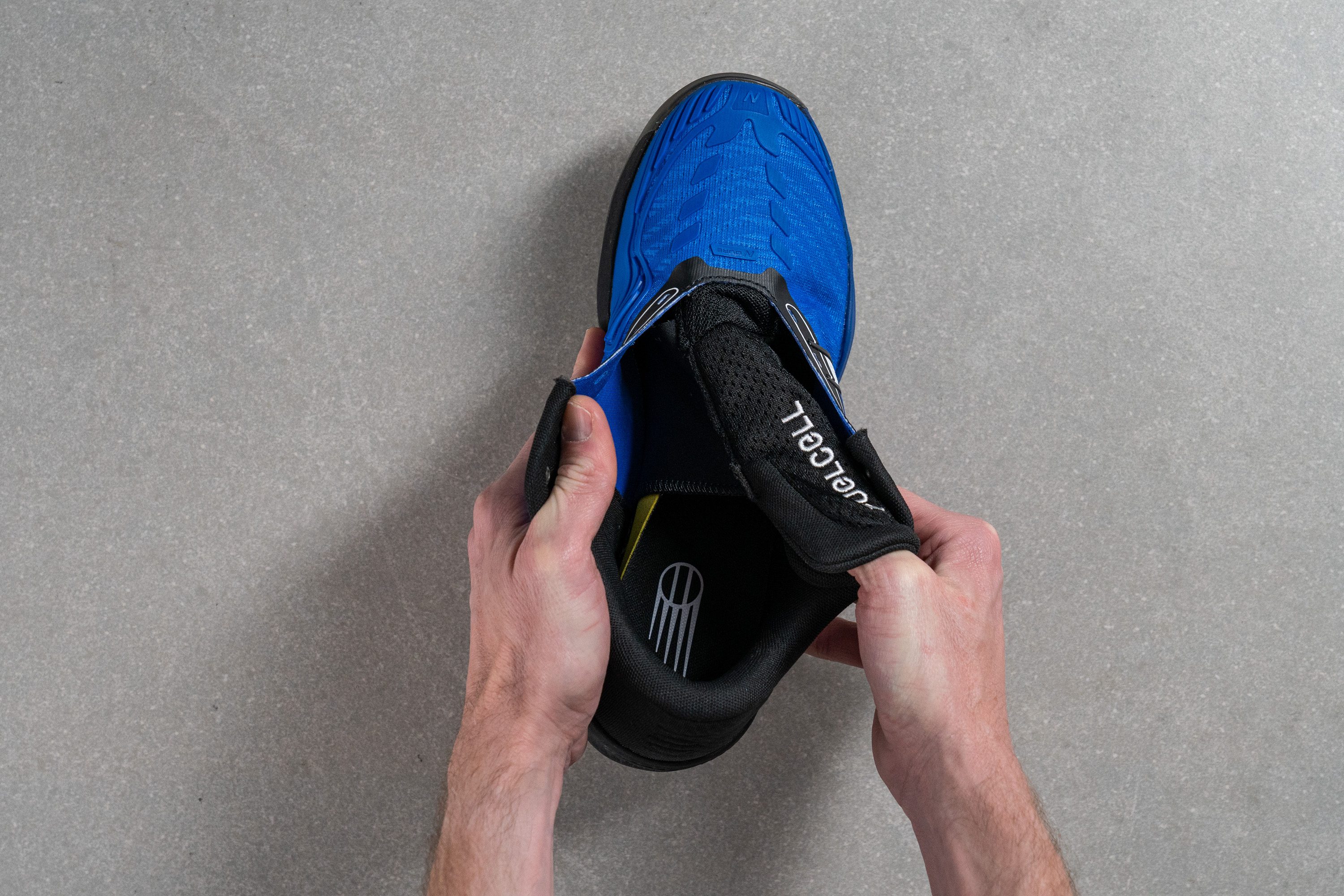
| FuelCell 996 v5 | Both sides (semi) |
Heel tab
No pull tabs on the New Balance 996 v5! Gotta use both of those hands.
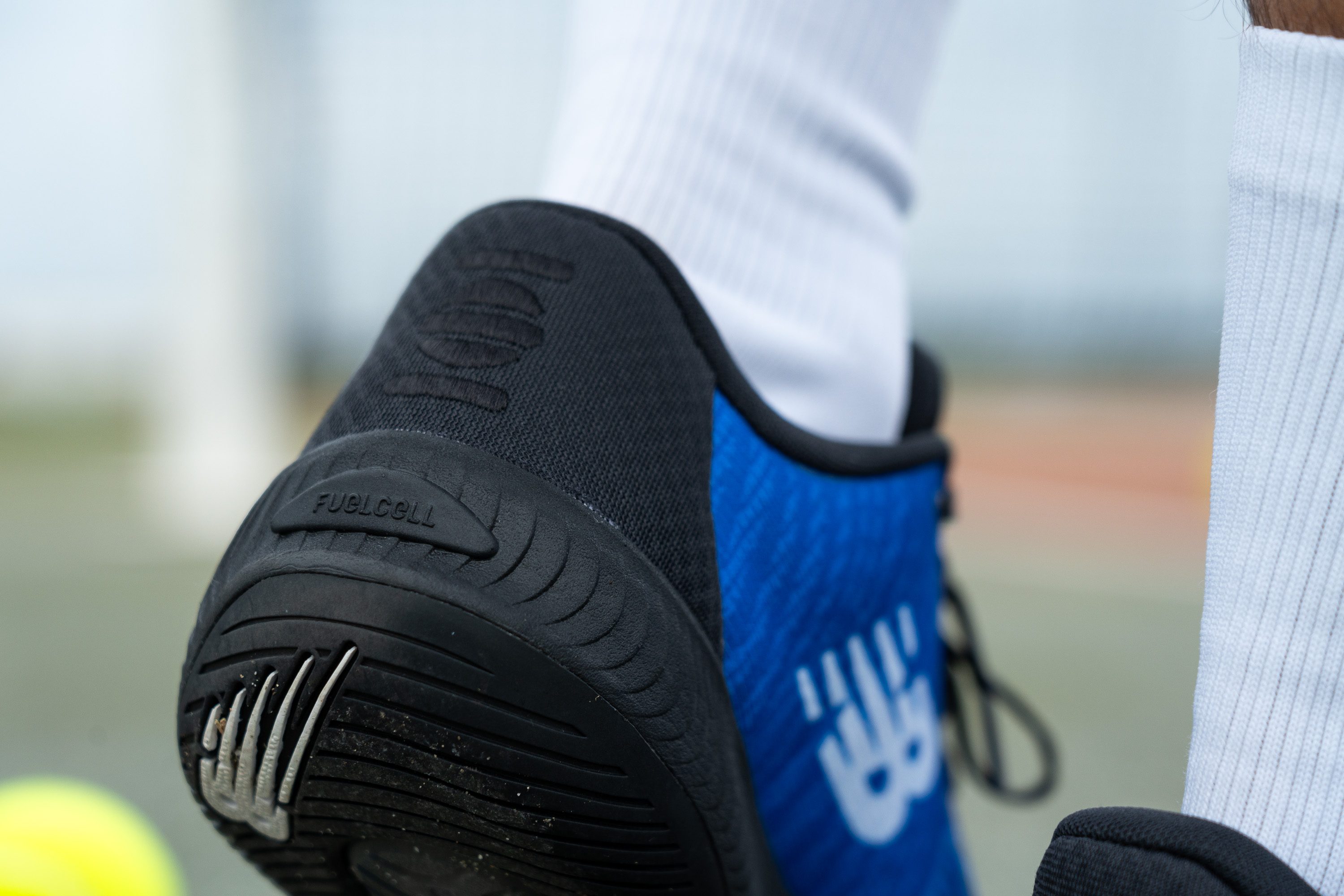
| FuelCell 996 v5 | None |

